Undergraduate
Course Offerings
For course descriptions, see the University of South Florida catalog. For individual section descriptions of our course offerings, view the course bulletin and the flyers below.
- Summer 2025 Course Bulletin
- Fall 2025 Course Bulletins
To request a permit into a closed or restricted course, contact your advisor for more information.
FALL 2025 flyers & Descriptions
Creative Writing
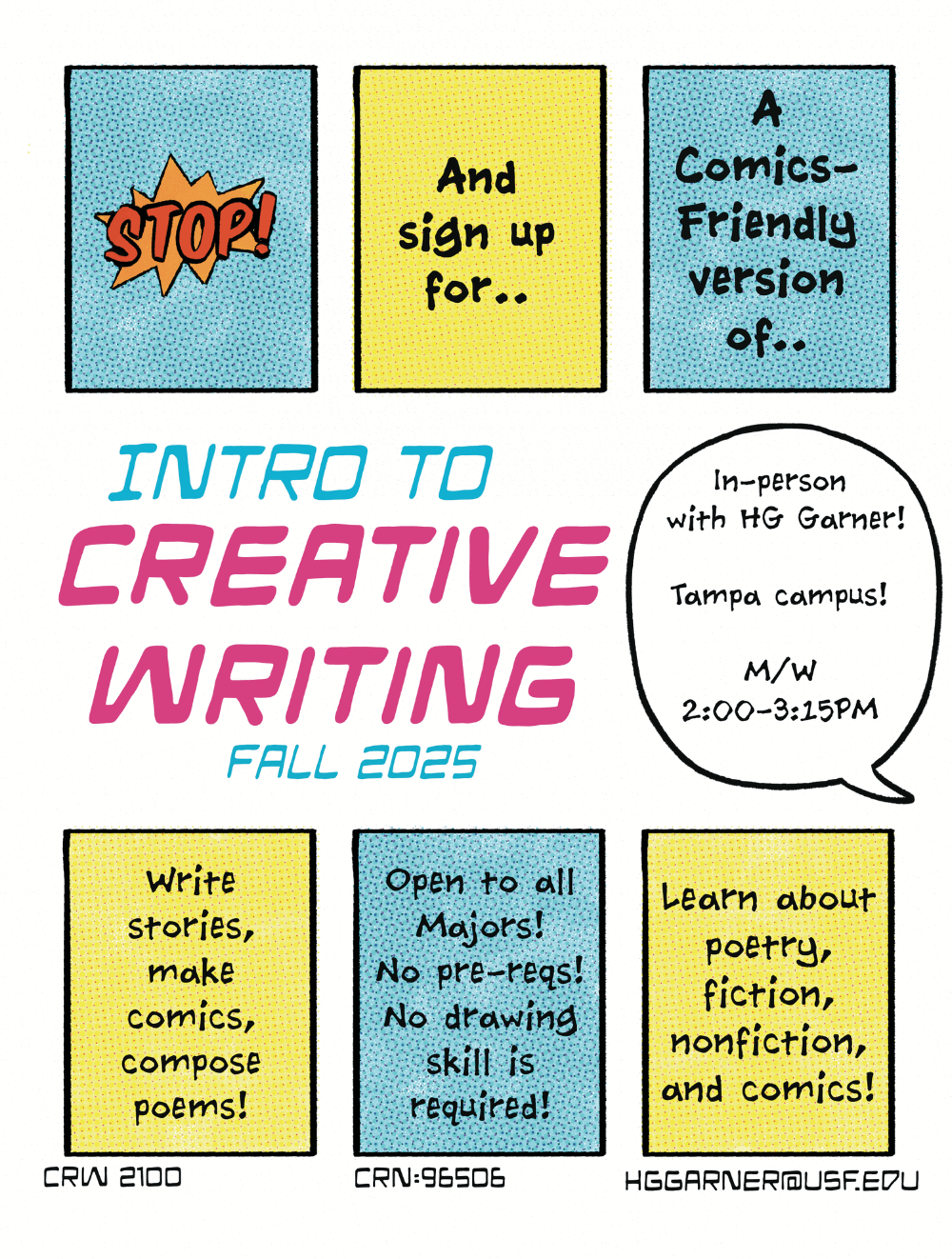
CRW 2100: Intro to Creative Writing
The introduction to creative writing is a course for any student who wishes to learn how to build a healthy creative process. In this welcoming course, you will learn how to generate new writing, how to deal with doubt and procrastination, and how to revise and edit creative writing effectively. You’ll experiment with fiction, poetry, creative nonfiction and memoir, working from weekly prompts. You will read and respond to published work by diverse, lively contemporary authors, and bring your drafts to small peer groups for review.
This course can be substituted for any one Form and Technique requirement.
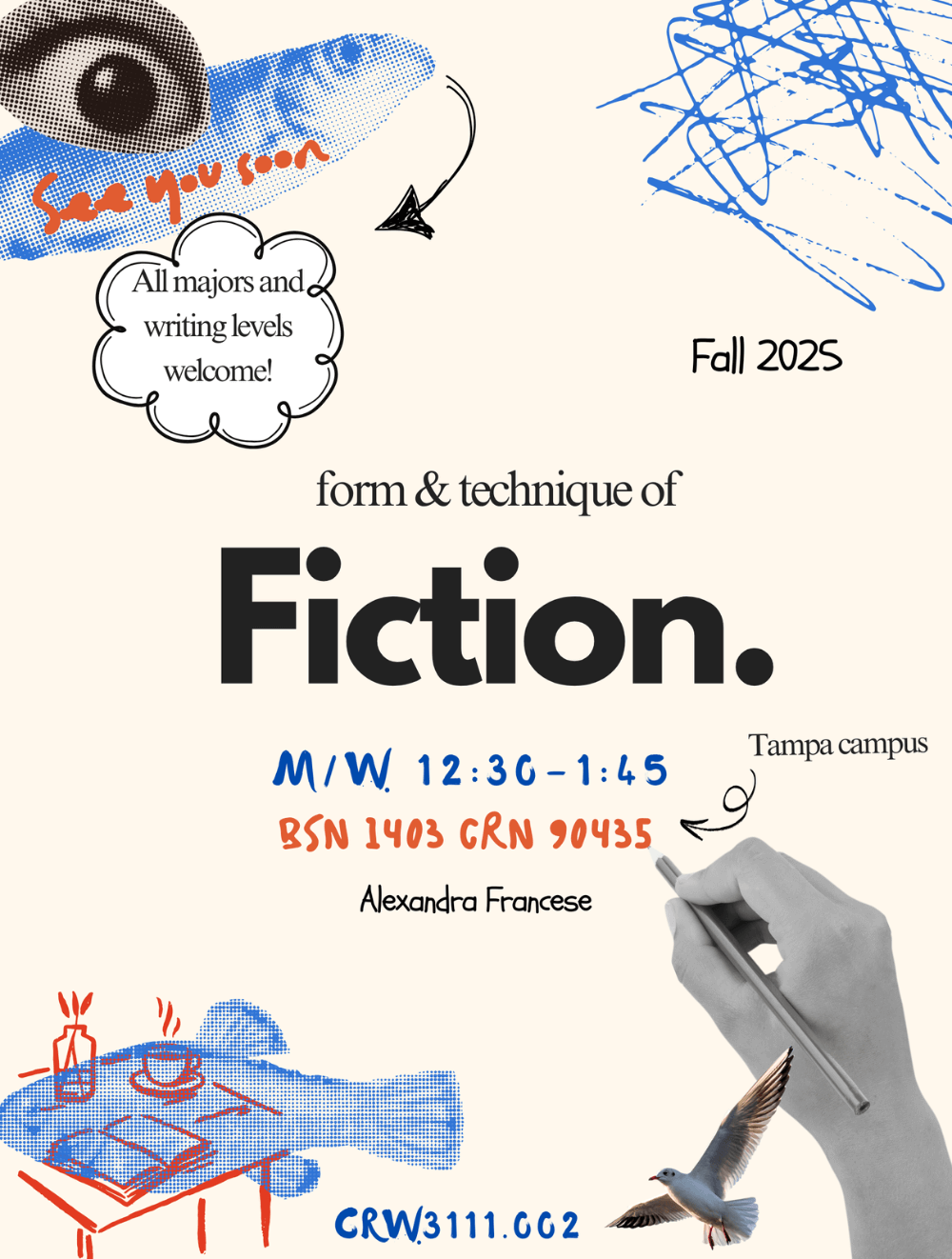
CRW 3111: Form & Technique of Fiction
Form and Technique of Fiction focuses on generating original work by the course participants and the study of work of established fiction writers. You’ll learn the how the different elements of fiction (scene, summary, dialogue) work together and you will practice narrative writing techniques (imagery, tension, characterization, etc.) used to create effective poetry. The forms and techniques presented in this course will enhance your writing skills across the board. If you choose to continue on as a storyteller, you’ll have an excellent foundation. This course serves as a pre-requisite for Fiction I and II and Nonfiction I and II.
In this course, you will become:
1) a stronger, more confident storyteller
2) familiar with a wide range of kinds of fiction
3) more confident in giving feedback on work in progress
All are welcome in this supportive, introductory creative writing course. No prior creative writing experience is expected or required.
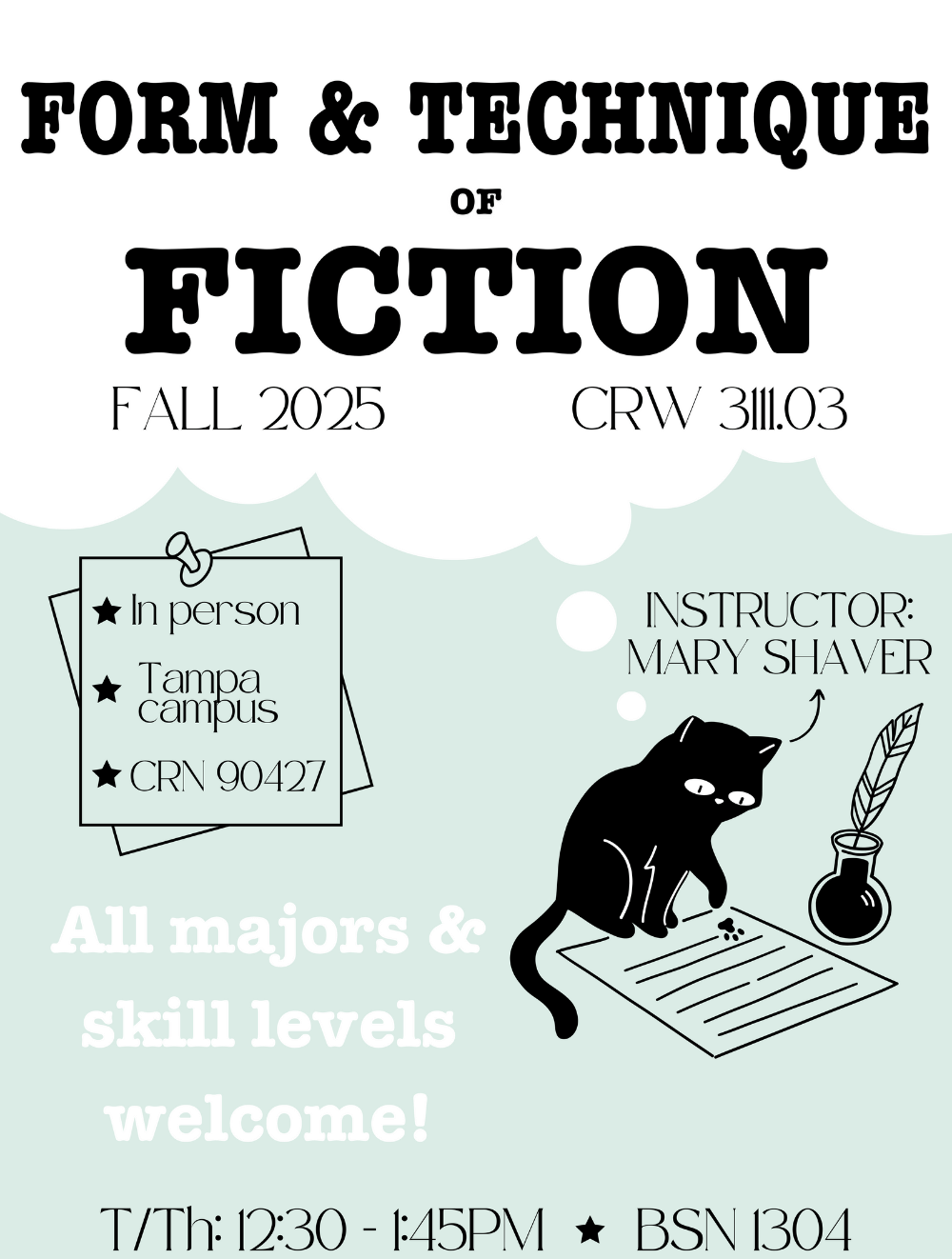
CRW 3111: Form & Technique of Fiction
Form and Technique of Fiction focuses on generating original work by the course participants and the study of work of established fiction writers. You’ll learn the how the different elements of fiction (scene, summary, dialogue) work together and you will practice narrative writing techniques (imagery, tension, characterization, etc.) used to create effective poetry. The forms and techniques presented in this course will enhance your writing skills across the board. If you choose to continue on as a storyteller, you’ll have an excellent foundation. This course serves as a pre-requisite for Fiction I and II and Nonfiction I and II.
In this course, you will become:
1) a stronger, more confident storyteller
2) familiar with a wide range of kinds of fiction
3) more confident in giving feedback on work in progress
All are welcome in this supportive, introductory creative writing course. No prior creative writing experience is expected or required.
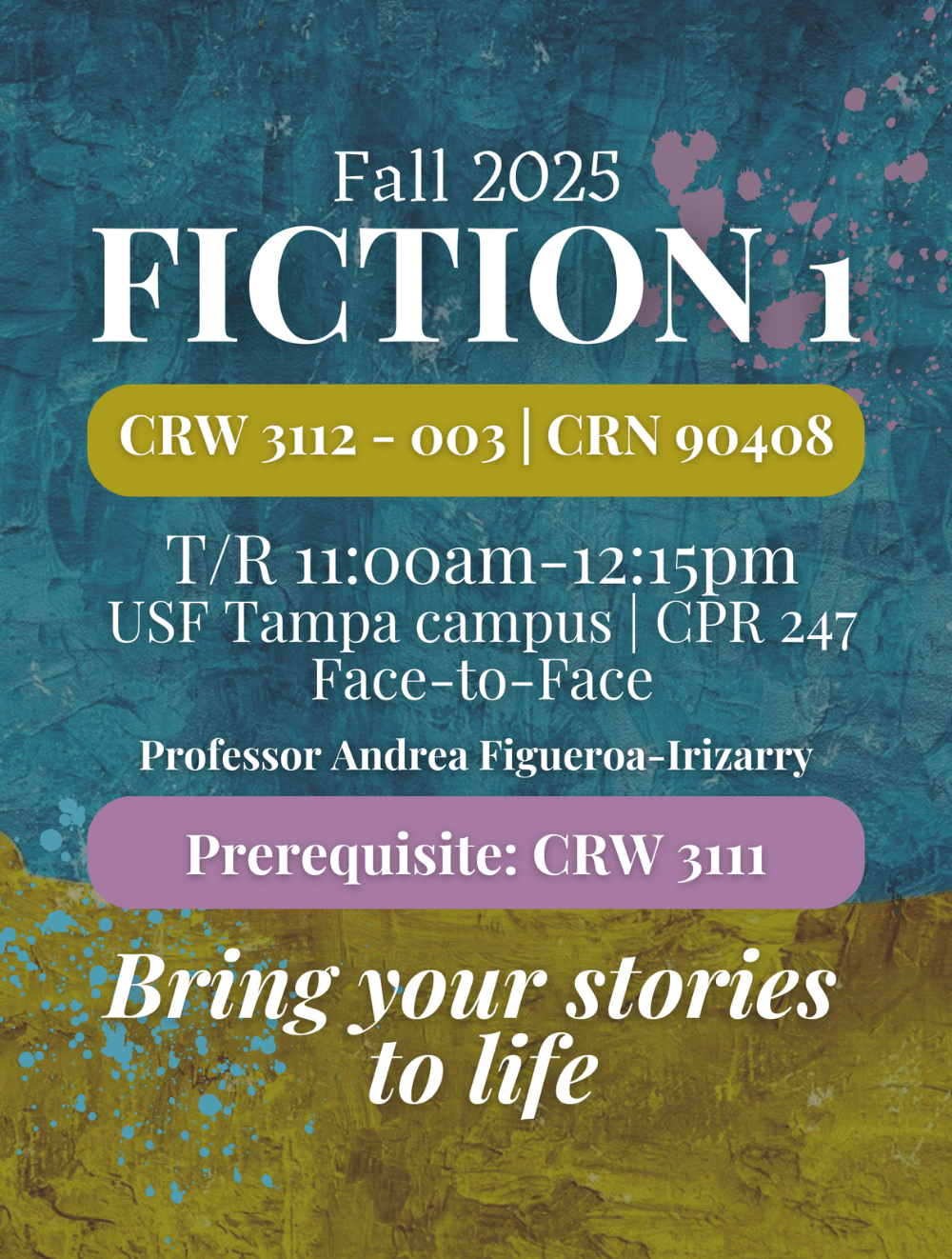
CRW 3112: Fiction I
This course will give us the chance to read, think, and discuss all things fiction. We will look at the ways writers establish style through craft elements in published short fiction, accompanied by short writing practices to help you culminate your ideas into various forms. In our workshops, we’ll practice critical thinking through close readings of peers’ drafts in small groups, constructive feedback, and critical discussion of learned techniques. Our goal is to find our voices as writers and build lasting writing habits for drafting and revision.
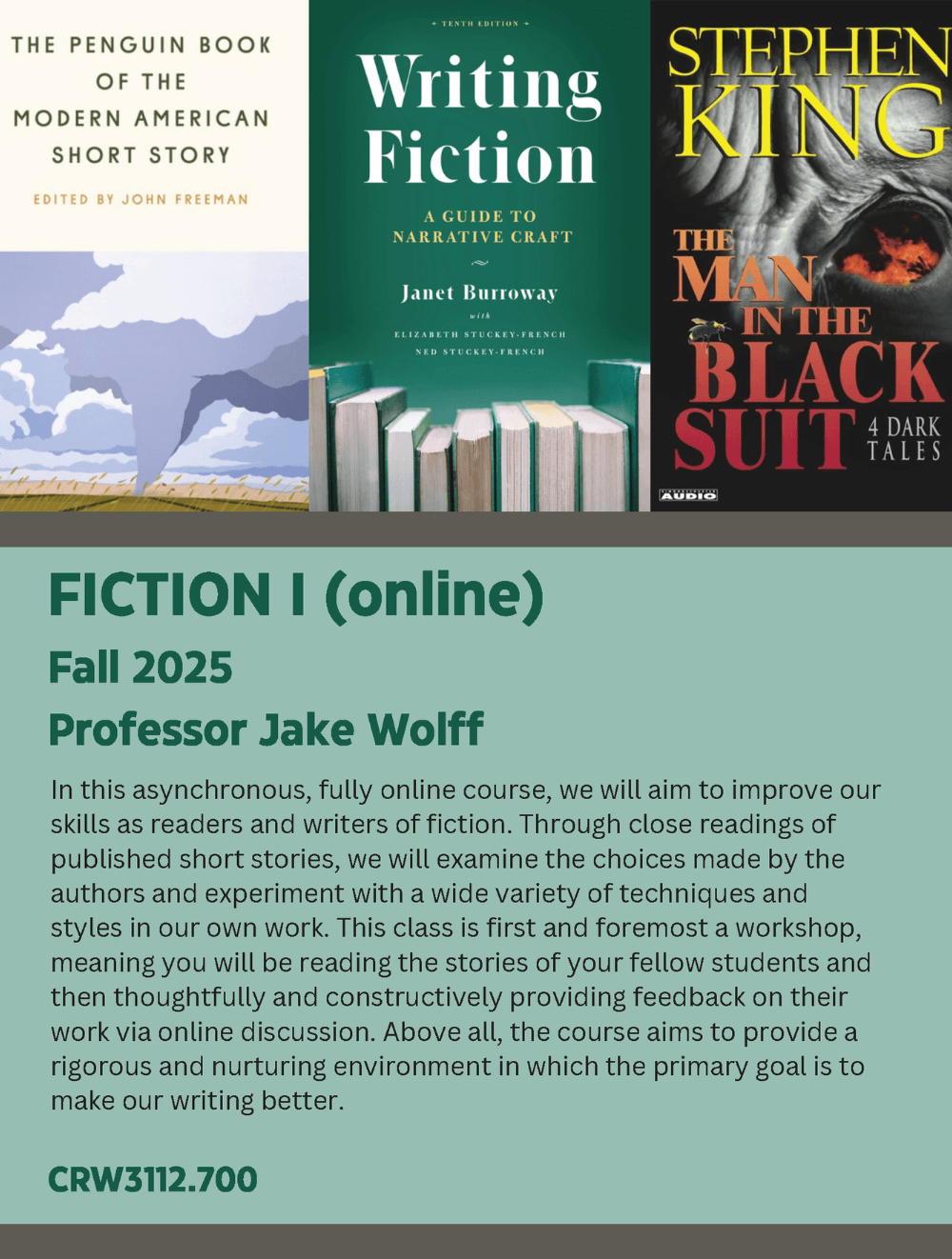
CRW 3112: Fiction I
In this asynchronous, fully online course, we will aim to improve our skills as readers and writers of fiction. Through close readings of published short stories, we will examine the choices made by the authors and experiment with a wide variety of techniques and styles in our own work. This class is first and foremost a workshop, meaning you will be reading the stories of your fellow students and then thoughtfully and constructively providing feedback on their work via online discussion. Above all, the course aims to provide a rigorous and nurturing environment in which the primary goal is to make our writing better.
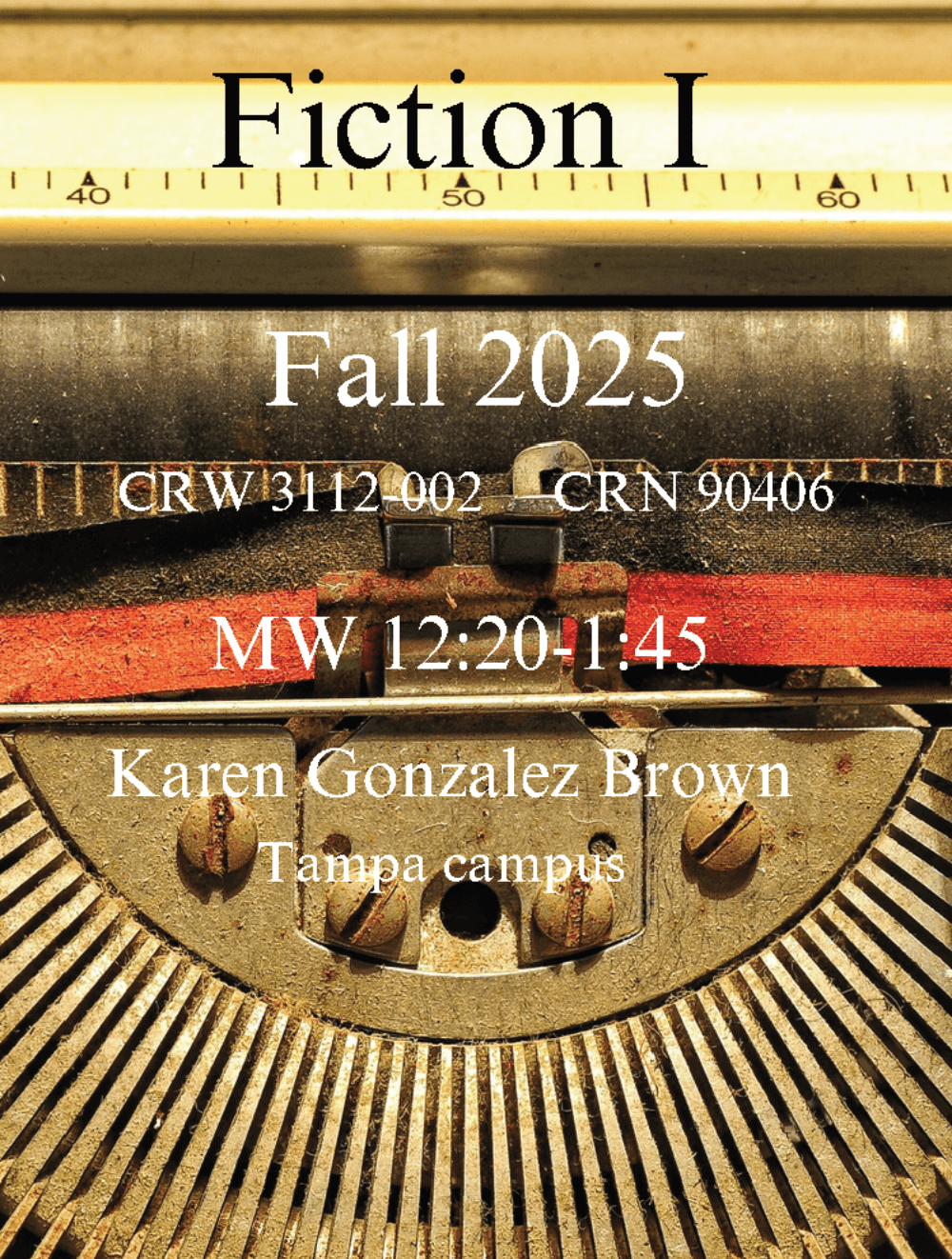
CRW 3112: Fiction I
What qualities make a short story memorable? How do I work to establish my voice as a writer? How do I revise my work? This course will encourage you to innovate, explore, and discover your own interests & style. You’ll incorporate the basic elements of narrative craft, practice the language of critique and analyze writers’ choices through readings and workshops. You will work through the process of creating a short story—from inception to multiple drafts, to a final, polished piece.
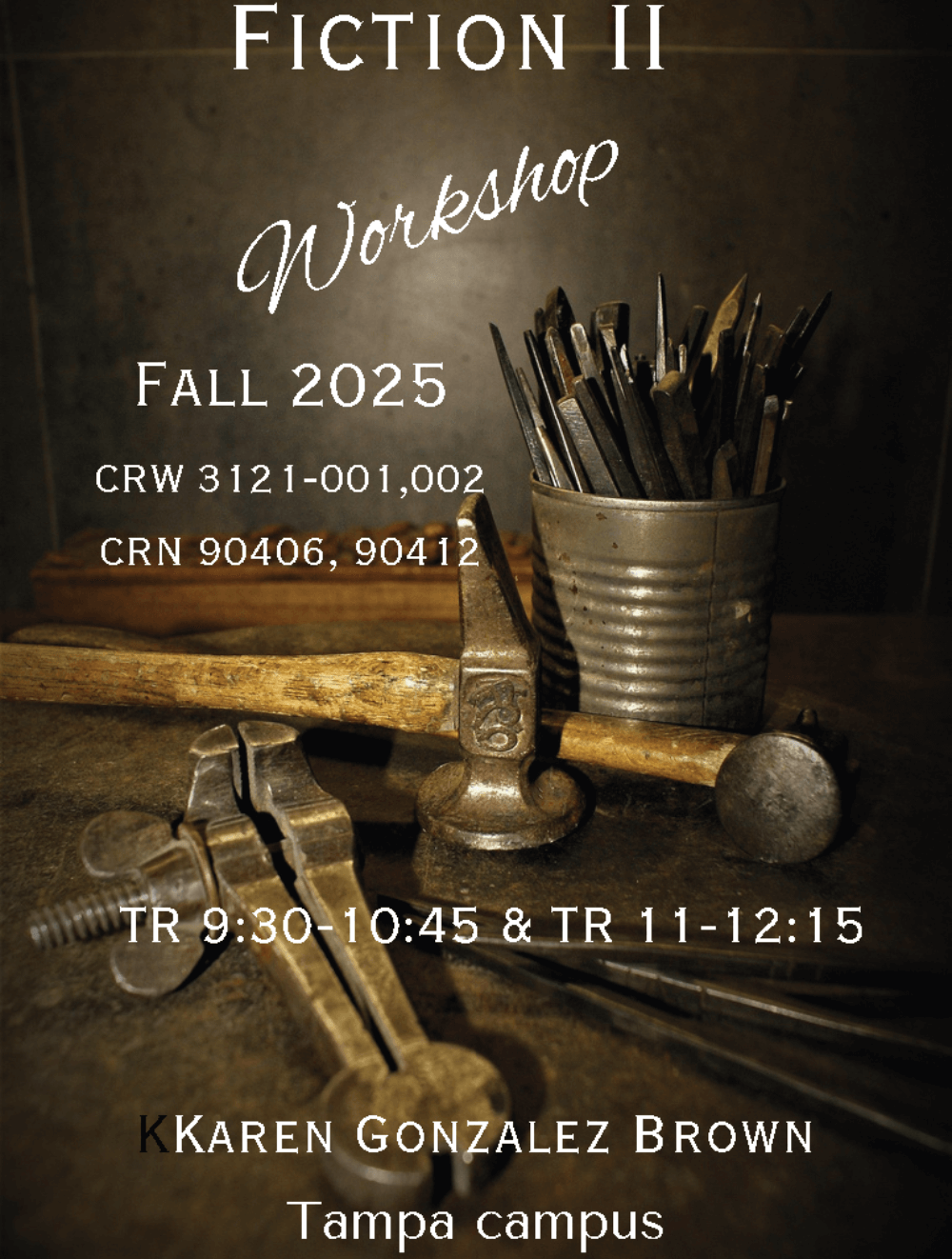
CRW 3121: Fiction II
The process of fiction writing, like any art, involves practice. This course will allow you the opportunity to produce writing for which you’ll facilitate discussion and collaboratively work with class members toward identifying each piece’s challenges and direction. These weekly workshop sessions, along with readings of contemporary short fiction, will familiarize you with the aspects of craft, and the various techniques used by fiction writers.
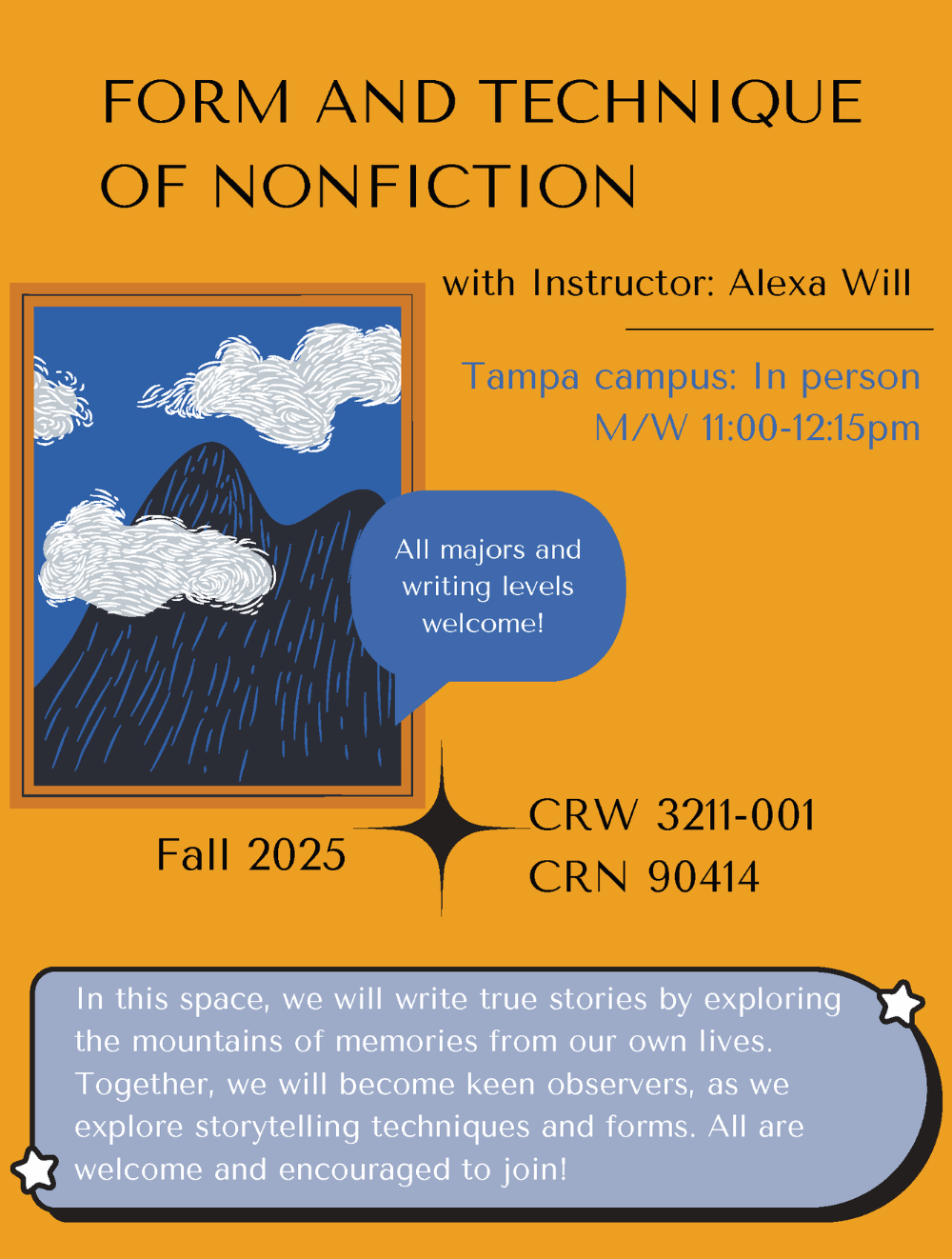
CRW 3211: Form & Technique of Nonfiction
Nonfiction gives creative writers the opportunity to use craft techniques from fiction and poetry (scene, character, setting, imagery, metaphor, etc) to write true stories. In this Form and Technique of Nonfiction course, we will learn about this popular genre, exploring various forms, including micro memoir, flash nonfiction, the list essay, visual narratives, and other forms. Considering the work of contemporary nonfiction writers, we will discuss a range of nonfiction craft techniques, and you’ll write and receive feedback on your own narrative nonfiction. As you’re writing your stories, you can speculate, use your imagination, and play with form. This course provides a wonderful opportunity for cross-training for both poets and fiction writers.
All are welcome in this supportive, friendly, introductory course. No previous nonfiction experience is assumed or expected.
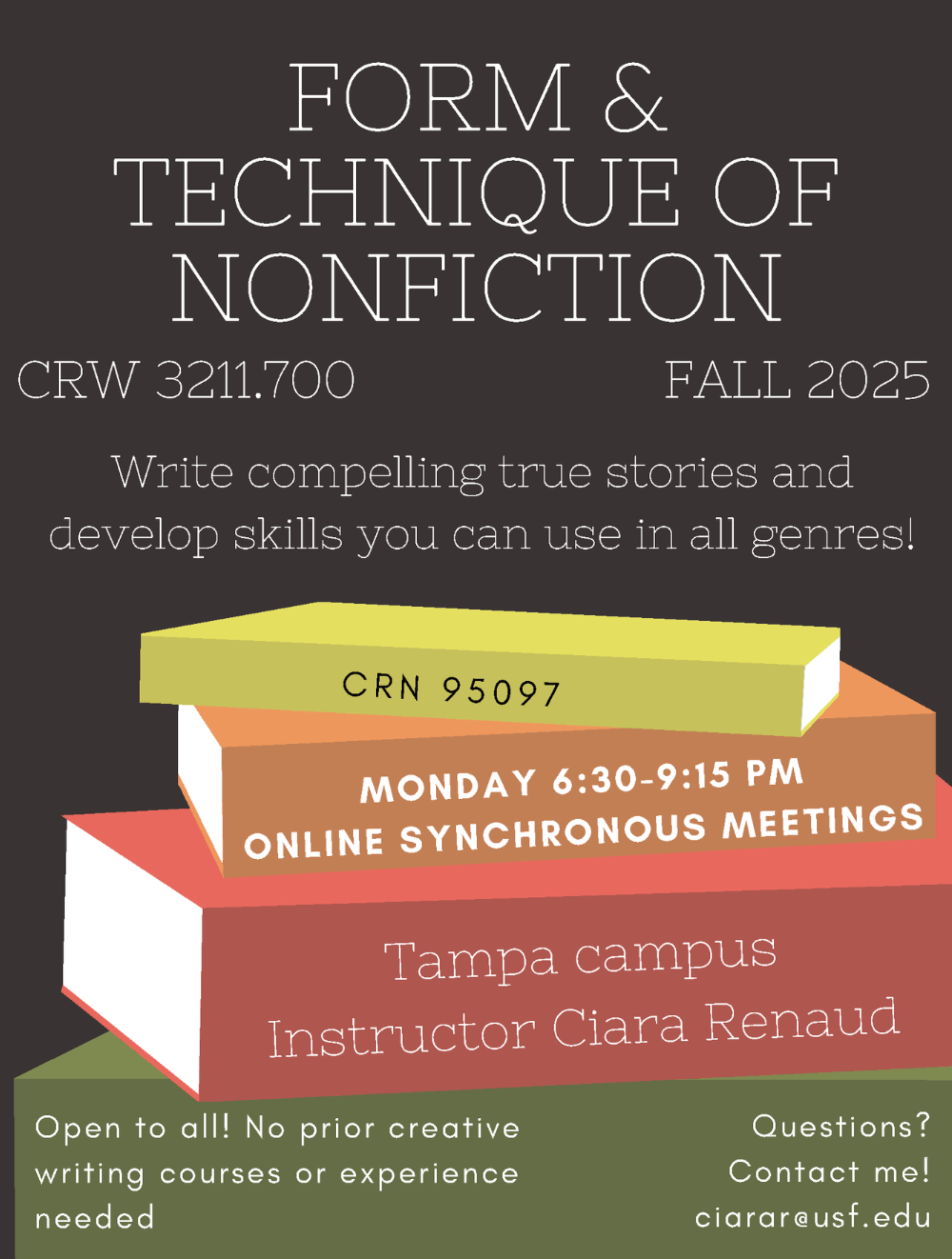
CRW 3211: Form & Technique of Nonfiction
Nonfiction gives creative writers the opportunity to use craft techniques from fiction and poetry (scene, character, setting, imagery, metaphor, etc) to write true stories. In this Form and Technique of Nonfiction course, we will learn about this popular genre, exploring various forms, including micro memoir, flash nonfiction, the list essay, visual narratives, and other forms. Considering the work of contemporary nonfiction writers, we will discuss a range of nonfiction craft techniques, and you’ll write and receive feedback on your own narrative nonfiction. As you’re writing your stories, you can speculate, use your imagination, and play with form. This course provides a wonderful opportunity for cross-training for both poets and fiction writers.
All are welcome in this supportive, friendly, introductory course. No previous nonfiction experience is assumed or expected.
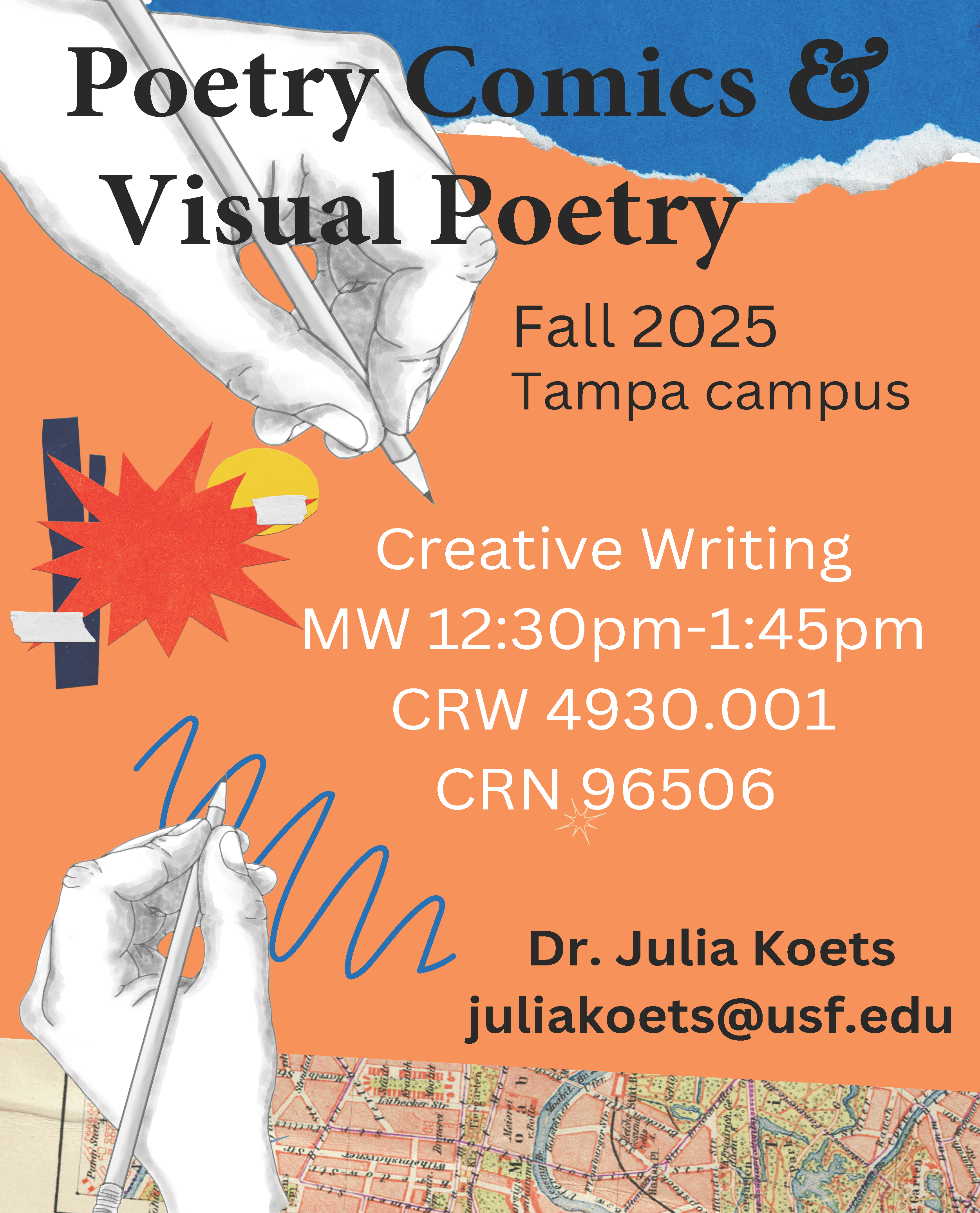
CRW 4930: Poetry Comics & Visual Poetry
In this creative writing class, the page will be a kind of canvas. Using a range of materials (like magazine cut-outs, photographs, glue sticks, paint, White Out, markers), we will experiment with images and text to make a range of visual poems, including collages, poetry comics, erasures, found poems, and visual reimagining. In preparing to create our own visual poems, we will study work from different poets and practice a variety of craft techniques. No prior experience necessary.
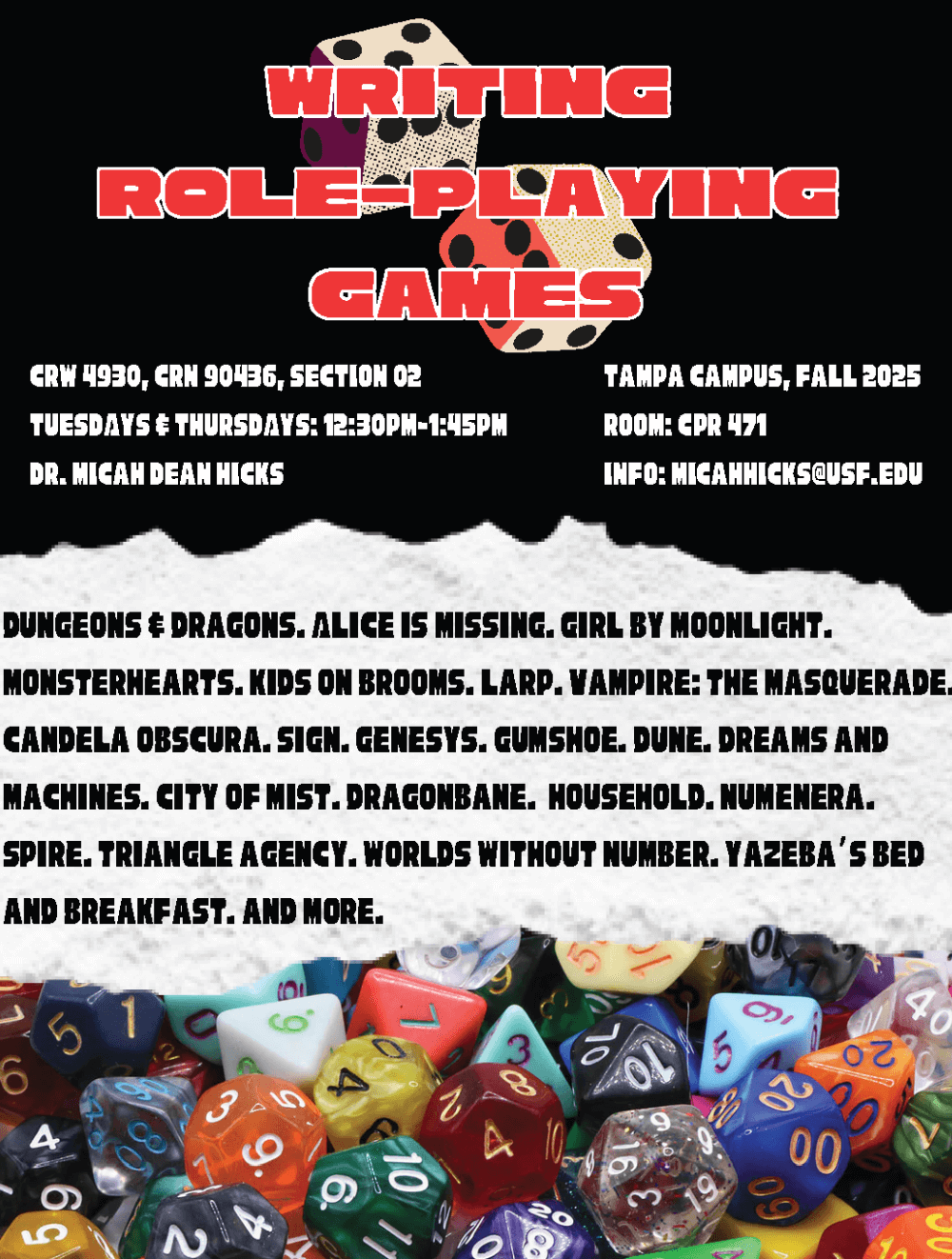
CRW 4930: Writing Role-playing Games
For fans of Dungeons and Dragons, tabletop role-playing games, and storytelling games of all kinds. In this class, students will dissect popular story game engines and study sample games from indie developers and larger publishers. Students will analyze how fiction, game mechanics, and performance intersect to create immersive shared stories. Working in teams, students will reflect on play sessions, hack existing games, create modules or other RPG content, and write original tabletop games. All players, brand new or experienced, are welcome.
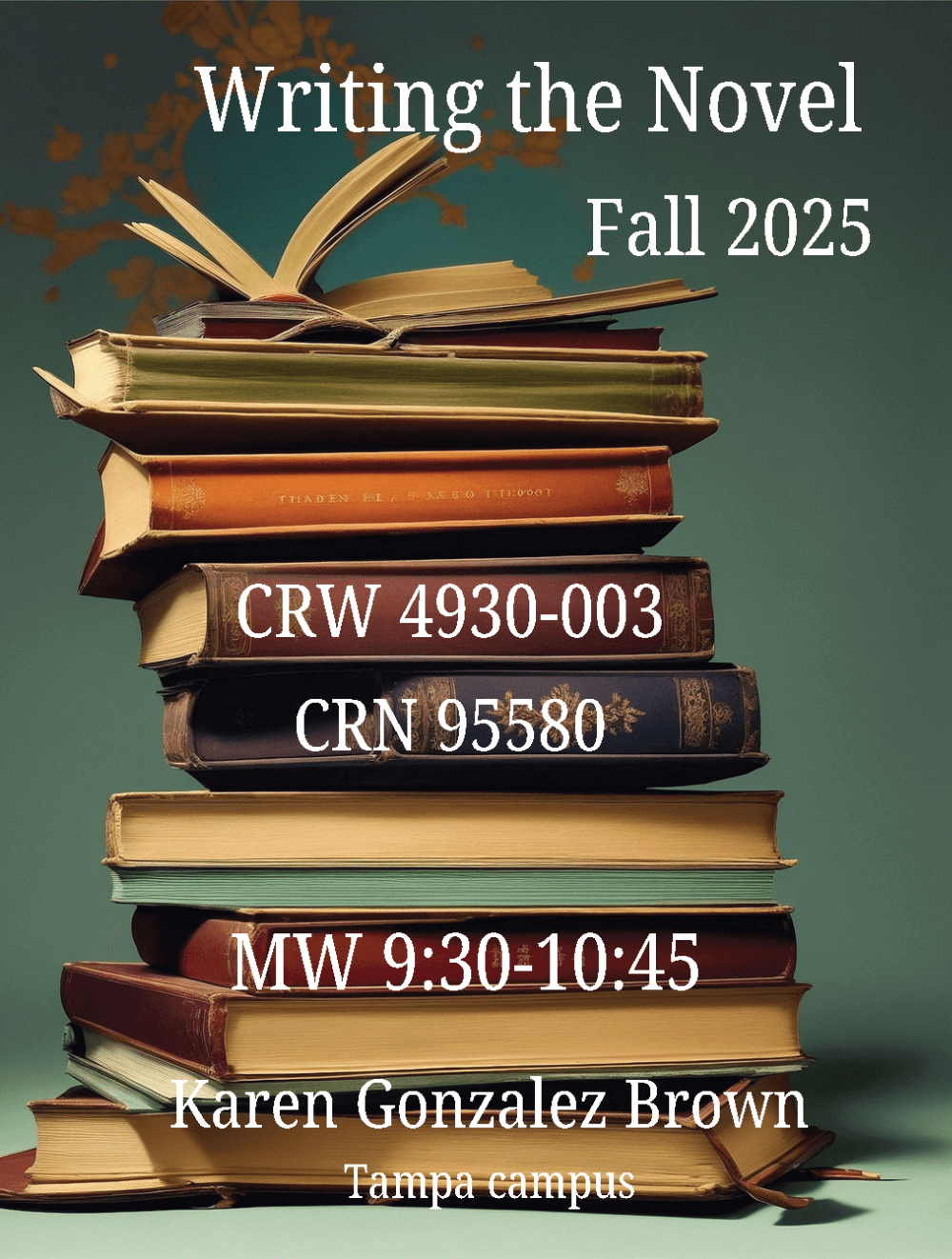
CRW 4930: Writing the Novel
This course will be a mixture of writing workshop and craft analysis. We will investigate how to structure a narrative, build scenes that move plot forward, and create characters readers will care about. We’ll examine the novel in its various forms, and consider strategies modeled by contemporary novelists. By the end of the course, you should have the skills you need to create a novel-length plot with a clear and meaningful structure, as well as compelling characters with enough depth to sustain your readers’ interest. Our goal will be to find good, practical advice on how to tell a story, without locking ourselves into fixed formulas.
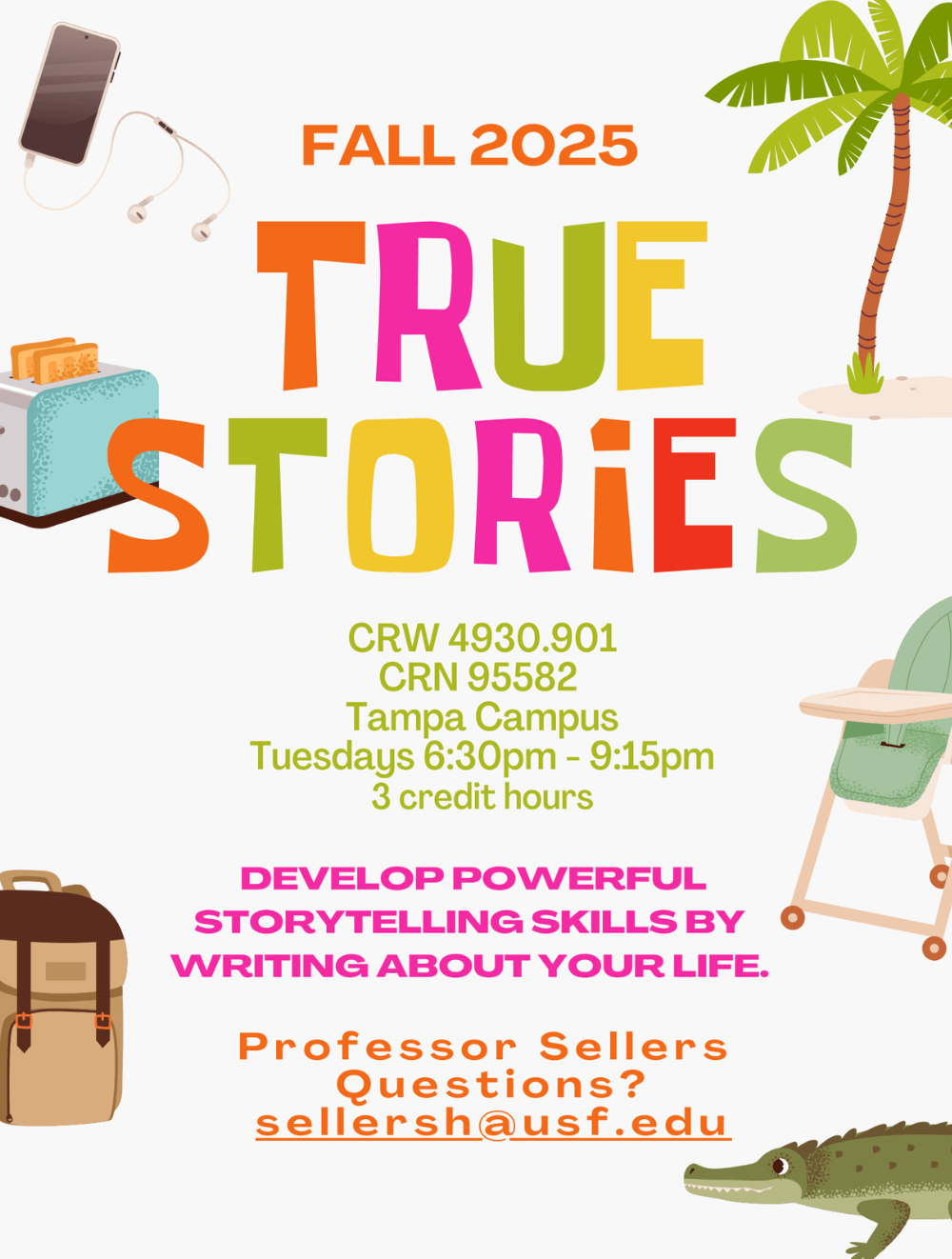
CRW 4930: True Stories
In True Stories you learn how to turn real life incidents into compelling narrative. The course is open to anyone who wishes to improve their storytelling skillset.
Through a mix of foundational and advanced storytelling techniques, we explore how to shape first-hand experience into riveting prose in order to captivate readers and listeners. We analyze the power of human voice, scene-building structures, storyboarding best practices, and ethical considerations in nonfiction.
We launch our work from a range of prompts, including personal essay, memoir, literary journalism, portrait, as well as exploring storytelling for Substack, spoken word, and podcasts. The reading assignments and playlists for this course are fun, inspiring, meaningful, lively, and engaging. You’ll also play with revision strategies that truly work.
Assignments include a) close reading and close listening, b) your original writing, and c) in-depth craft-based generative workshops. Every assignment is designed to help you significantly refine your ability to transform memory and observation into dynamic, immersive stories.
You will leave the course with a deeper understanding of how to craft true stories that resonate. If you are interested in performing and/or publishing your true stories, support is provided, but this is not a course requirement.
Fiction writers, poets, journalists, multi-media artists, and nonfiction writers are all most welcome. Questions? Email the professor: sellersh@usf.edu.
The course is open to all. Pre-requisite: ENC 1101 and ENC 1102 with a minimum grade of C.
English (General)

ENG 3014: Intro to Literary Methodology
In this course, you'll explore the fundamental tools of literary studies, including close reading, contextual reading, and critical reading. You'll also practice important skills, including research methods, citations, the writing process, and developing presentations; finally, you'll even start to take some initial steps toward identifying your career goals. Our approach to this work will be shaped by a shared, in-depth examination of Mary Shelley's groundbreaking 1818 novel Frankenstein. As an added bonus, the novel is currently being adapted by the celebrated Spanish horror director Guillermo del Toro; the film, starring Oscar Isaac and Jacob Elordi, is slated for release near the end of this course, in November 2025.

ENG 4060: History of the English Language
Have you ever wondered how English came to be what it is today? English spelling seems haphazard. Writers and editors argue over usages. You’ve probably heard the old joke about English mugging other languages for their words. Why does this apparently chaotic tongue have speakers around the world?
English began as a set of dialects on a small island near what was then the edge of the Western world. In this course, you will learn stories of our shared language from prehistory to twenty-first-century global Englishes. We will study how past and contemporary variants developed and how dialects relate to geography, class, race and ethnicity, and other factors. We will explore some of the many different Englishes in use now as well as characteristics and cultural settings of English in different eras. History of the English Language will also introduce you to valuable resources that can help you beyond this class to other courses and life and work beyond the university. You will gain insights into the richness and variety of Englishes as you improve your critical thinking, research, and writing skills. No previous experience with linguistics or the history of English is required.

ENG 4934: Senior Literature Seminar
The Senior Literature Seminar will be the capstone course for literature majors, emphasizing the degree-program outcomes. Students will develop and synthesize the knowledge and skills gained in the literature major, as they will explore a specific topic, which will vary. This is a required course for English majors.

ENG 4935: British Literature and Culture: 1859
Published in 1859, Darwin’s On The Origin of Species was a revolutionary text; its impact was profound, reverberating across the social, religious, and scientific communities. It challenged traditional ideas about the creation of the world and presented new models of natural, human, and social development. In the same year, John Stuart Mill published his treatise on individual freedom and social tyranny, On Liberty, touching themes explored by Charles Dickens in his historical novel, A Tale of Two Cities. France embarked on its ambitious effort to dig a canal through the Egyptian desert, an effort that would extend the reach of Britain’s imperial grasp. As America moved steadily towards civil war, Tennyson reimagined the legend of Arthur, George Eliot published her first novel, and Wilkie Collins helped lay the foundations of a new genre—the sensation novel—with The Woman in White. It was a busy year.
This Honors seminar explores British literature and culture in the year 1859. We will examine the ways in which literature, journalism, and scientific and political thought left an enduring mark on Victorian culture. Our core objects of study are the major literary texts published in 1859, including Dickens’s A Tale of Two Cities, Eliot’s Adam Bede, Tennyson’s Idylls of the King, and Collins’s The Woman in White. We will also sample some Victorian drama—Boucicault’s The Octoroon and Watts Phillips’s The Dead Heart. We will explore Victorian journalism and, of course, acquaint ourselves with the important texts by Darwin (On the Origin of Species) and Mill (On Liberty). Through close reading of texts and engagement with periodicals, art, and political discourse, we will try to develop some coherent understanding of this transformative year.

LIN 4671: Traditional English Grammar
A course primarily using the sentence diagram to present a detailed analysis of the parts of speech, verb tenses, sentence functions, and other basic grammatical classifications of traditional English grammar.
Literature
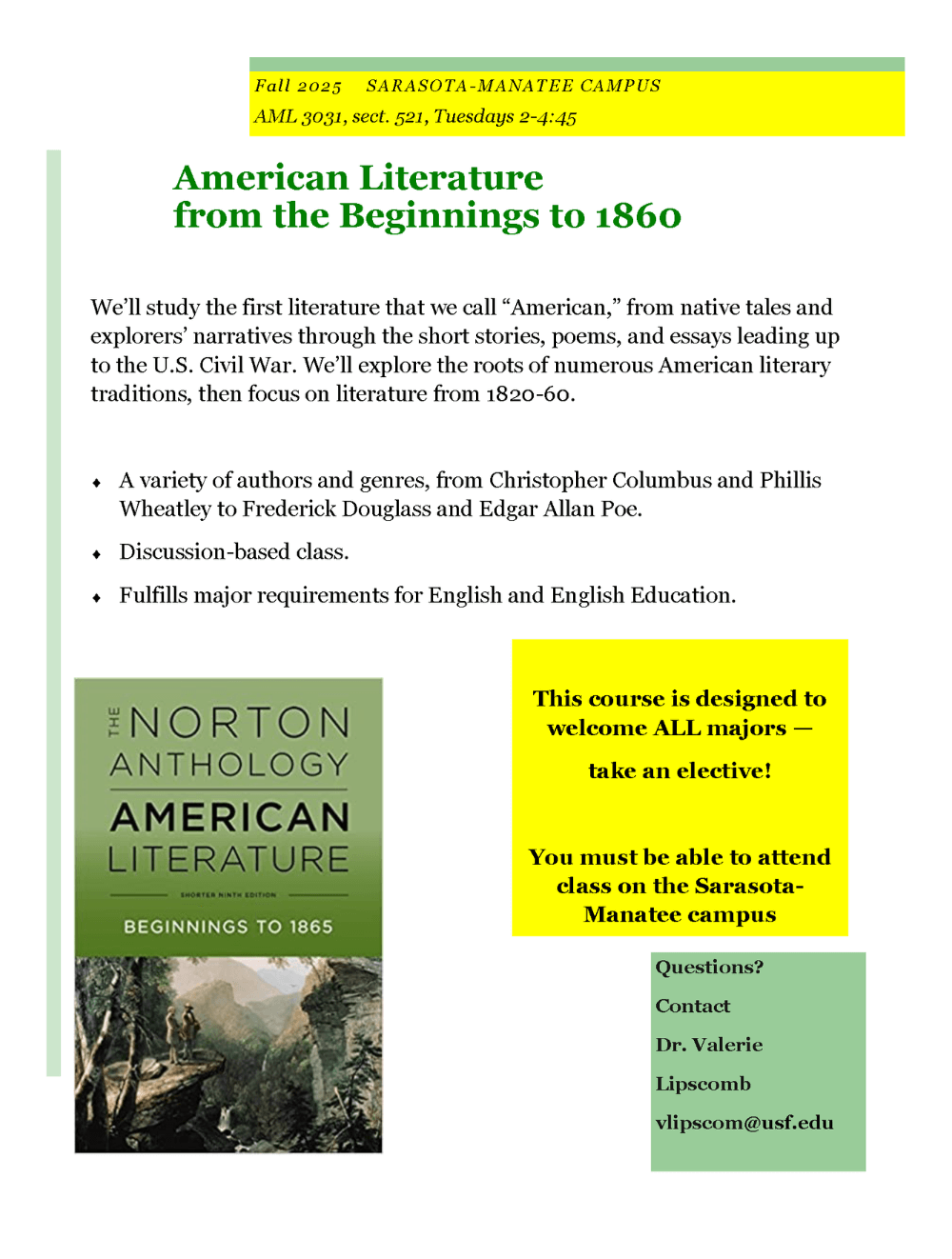
AML 3031: American Literature From the Beginnings to 1860
A study of representative works from the period of early settlement through American Romanticism, with emphasis on such writers as Cooper, Irving, Bryant, Hawthorne, Emerson, Melville, Thoreau, and Poe, among others.
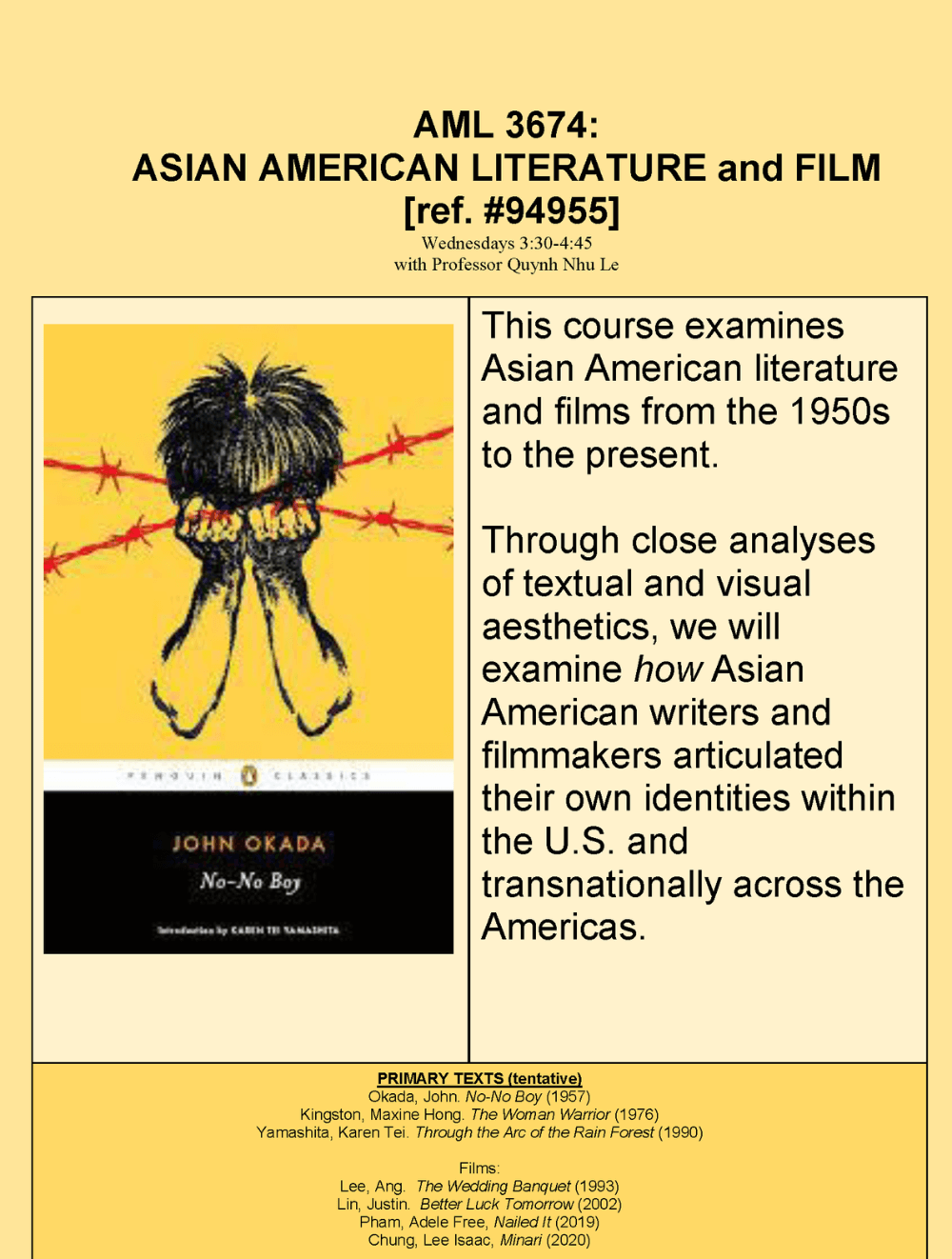
AML 3674: Asian American Literature & Film
This course is a critical survey of Asian American popular culture, including but not limited to literature and films. We will emphasize the social and political contexts out of which these cultural productions emerge by analyzing theories, cultural dialogue, and stereotypes that circulated about Asian Americans including: the “Heathen Chinee,” “Perpetual Foreigner.” “Yellow Peril,” “Dragon Lady,” and “Model Minority.” Through close analyses of textual and visual aesthetics, we will examine how Asian American writers and filmmakers re-presented and negotiated these histories and mainstream depictions, and articulated their own experiences and identities within the U.S. and transnationally across the Americas. In doing so, we will treat popular images and understandings of Asian American communities not as essential and unchanging categories of identity, but as social productions that are consistently represented, contested, and reproduced.
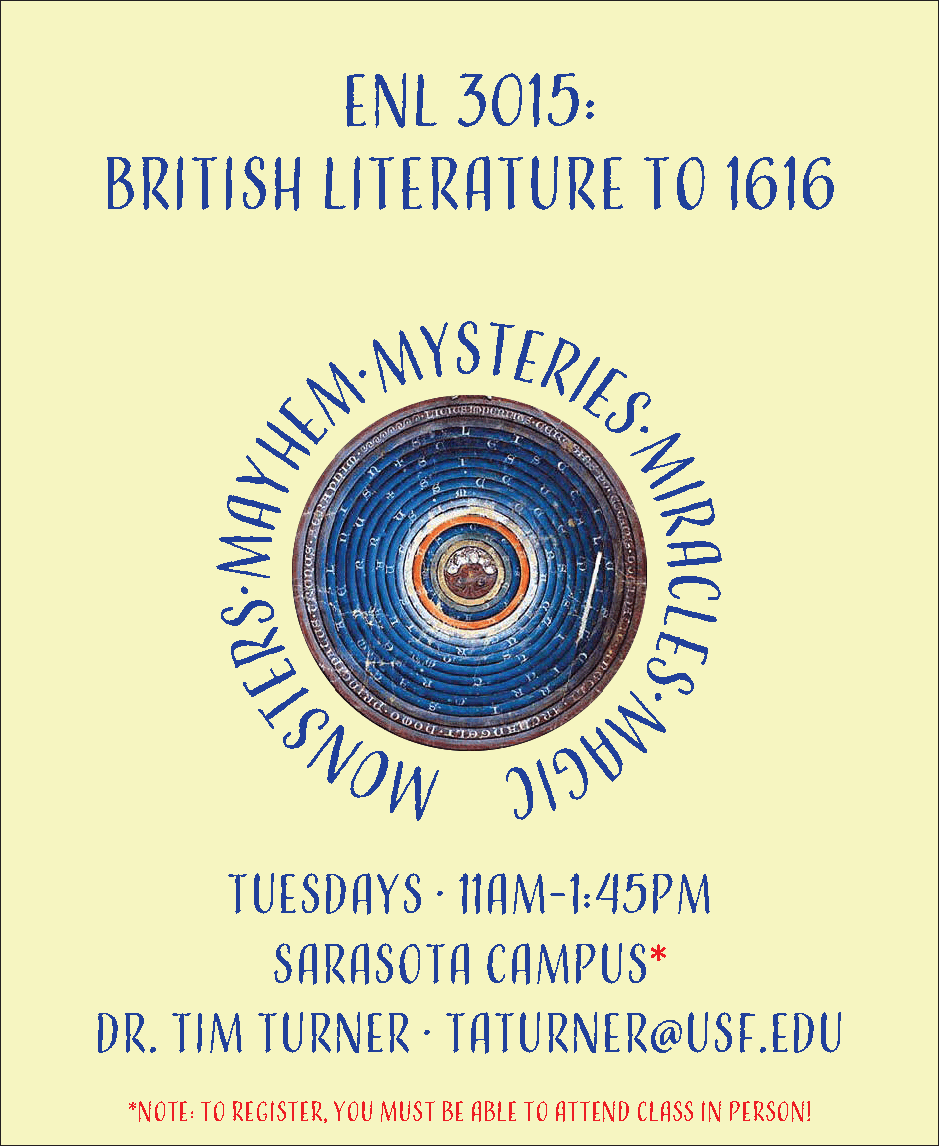
ENL 3015: British Literature to 1616
In this course, we'll go on a journey together to explore the origins of the English language and the earliest examples of its literature, from the Age of the Vikings (Beowulf), through the Medieval period (The Canterbury Tales), to the early English Renaissance (Doctor Faustus). We'll also bring the texts to life by pairing our readings with a look at the visual culture of the Middle Ages and Early Modernity, including digitized examples of illuminated manuscripts, paintings, and woodcuts. After our journey comes to an end, you'll have a richer, more informed understanding of what made these texts so popular with readers in the past—as well as what makes them relevant to our lives in the present.
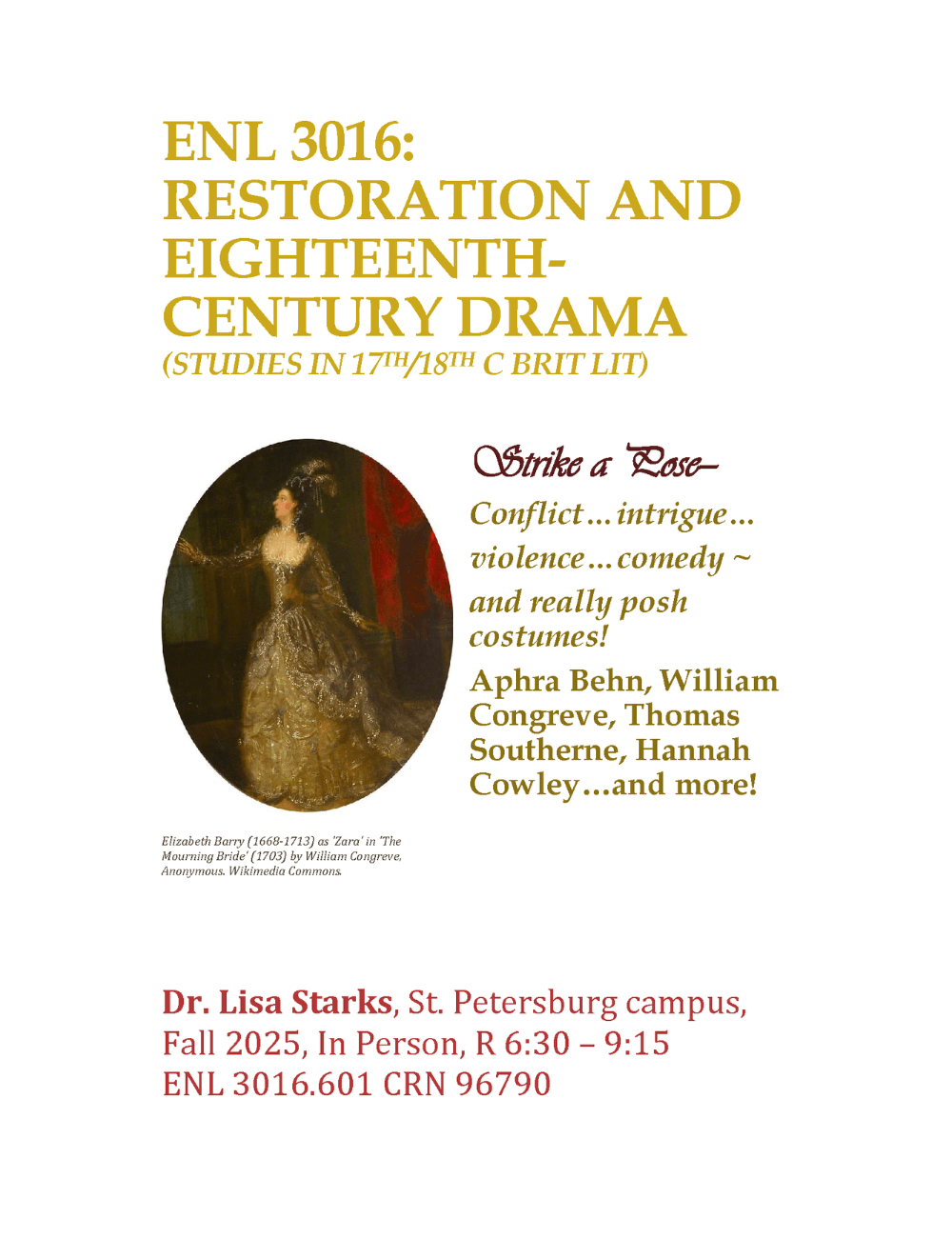
ENL 3016: Studies in 17th and 18th Century British Literature
Love Bridgerton? Read the plays full of snappy banter, sexual intrigues, colorful fops, and sharp gossips (the original Lady Whistledowns!) that greatly inspired the later Regency era and its depictions in Julia Quinn’s Bridgerton novels and the Netflix series. In ENL 3016, we will explore the dazzling, brilliant, satirical, witty drama of the English Restoration and Eighteenth Century. We’ll study plays by both male and female playwrights that are representative of the different kinds of drama for which this era is best known. We’ll approach these plays from their own cultural contexts, examining how they represent gender, race, class, and politics. We’ll also examine how these plays speak to us in performance today. We’ll learn through readings, in-class collaborative activities, online discussions (with writing, research, and creative options), quizzes, essay tests, and an Adaptation Project.
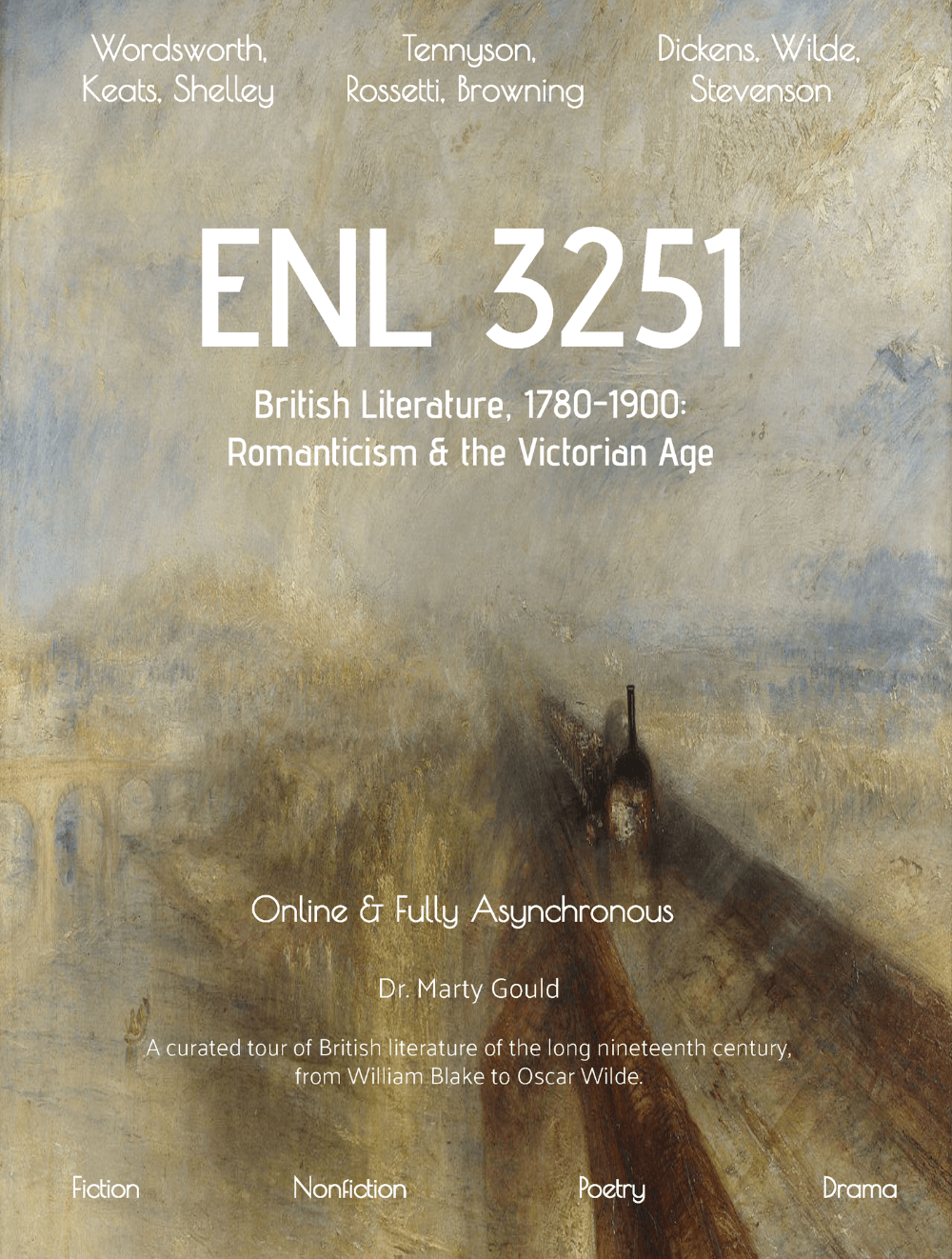
ENL 3251: British Lit 1780 - 1900
This course is a survey of British literature of the long nineteenth century, from the Romantic movement through the Victorian age. This course will be offered online, an asynchronous format (so no real-time meetings).
The nineteenth century was a period of dramatic, and unprecedented, change in Britain. This was the period of the Industrial Revolution, which marked the beginning of our modern mechanical age. It was the Age of Empire, the beginnings of modern globalization. And it was a period of social reform: the abolition of slavery, the development of labor laws, the creation of universal elementary education, mandated improvements in urban sanitation, and the expansion of the vote. Through these and other developments and reforms, the modern world, the world we recognize as our own, came into being. The texts we will study this semester recorded and responded to these social and technological changes, but in doing so they spoke to issues we continue to grapple with today, making these texts familiar and relevant.
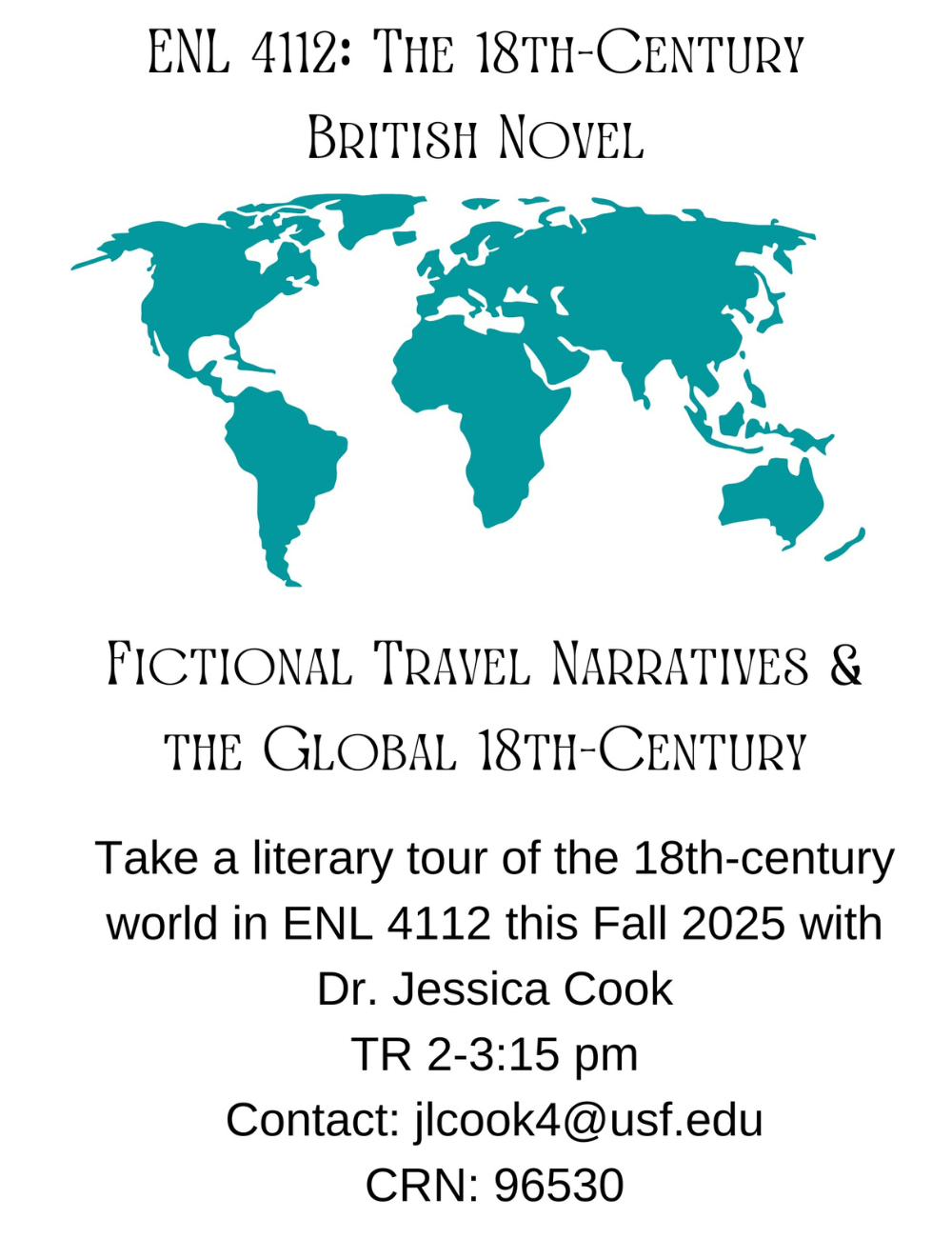
ENL 4112: 18th Century British Novel
In this course we’ll read fictional prose narratives set in various locations of the eighteenth-century global world: the Caribbean and South America, the American colonies, Europe, and Great Britain itself. We’ll discuss how Britons perceive themselves and others as they travel in and around their home country and beyond; their adventures are sometimes comic, sometimes tragic, and always interesting. We’ll encounter a wide range of travelers, including several castaways on deserted (and not so deserted) islands, a biracial heiress who leaves her native Jamaica for an arranged marriage in England, a naïve tourist who finds romance and what she hopes is a Gothic mystery, and a young aristocrat on a raucous Grand Tour of Europe. Course readings will feature both full novels and shorter excerpts from longer texts; tentative reading list includes Aphra Behn’s Oroonoko, Daniel Defoe’s Robinson Crusoe, Jonathan Swift’s Gulliver’s Travels, Unca Eliza Winkfield’s The Female American, the anonymous The Woman of Colour, Frances Burney’s Evelina, Jane Austen’s Northanger Abbey, and Mackenzie Lee’s contemporary YA novel, The Gentleman’s Guide to Vice and Virtue. Contact Dr. Jessica Cook (jlcook4@usf.edu) with any questions about the course, or your academic advisor with questions on what degree requirements this course will fulfill. This class will meet in-person on the Tampa campus on Tuesdays and Thursdays from 2-3:15 pm.
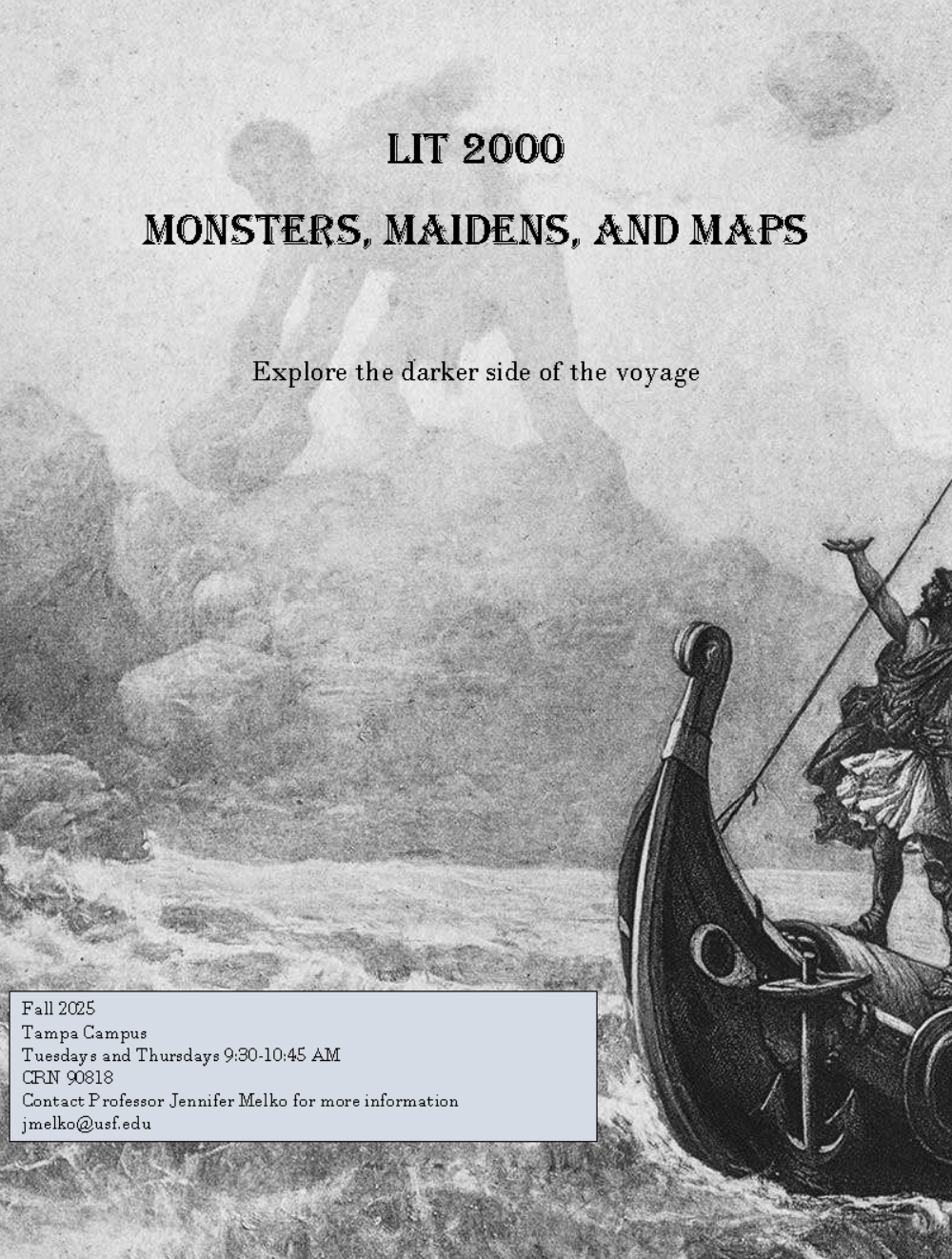
LIT 2000: Intro to Literature
Explore the darker side of the voyage. This section of LIT 2000, Monsters, Maidens and Maps, introduces students to the formal, cultural, historical, and theoretical dimensions of Gothic literary texts including novels, short stories, poetry, and drama. By examining journey narratives and the liminal spaces constructed within these works, students will gain an understanding of the ways Gothic conventions of space, haunting terrors, and monstrous figures shape physical, psychological, and metaphoric constructs within literary texts. Using Homer’s classic epic, The Odyssey as a foundation, we will explore how the poem, its adaptations, and works influenced by it have come to represent both the psychological and societal anxieties that create the human psyche.
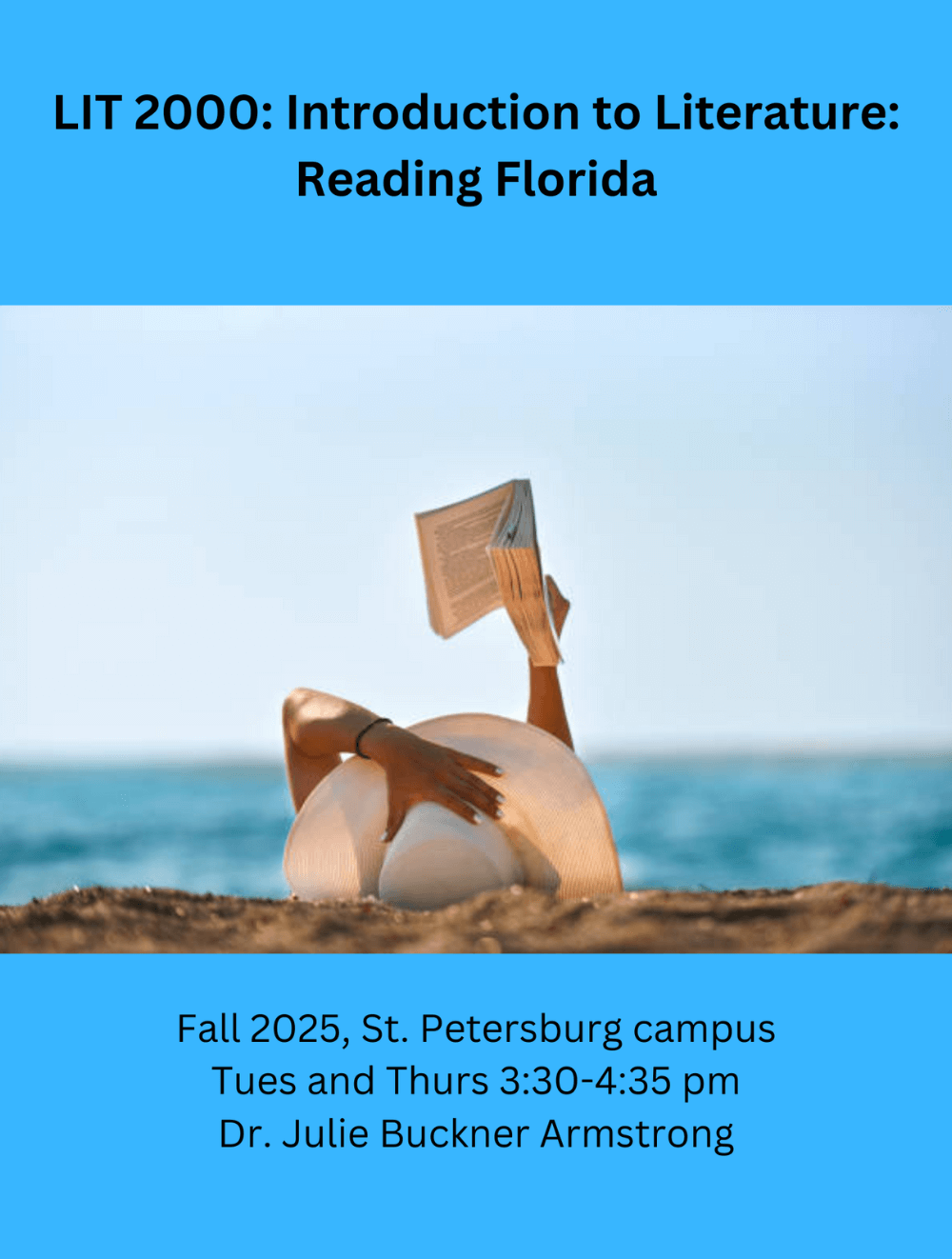
LIT 2000: Intro to Literature
This course will introduce students to the three major literary forms of prose, poetry and drama as well as to various “schools” of literary criticism.
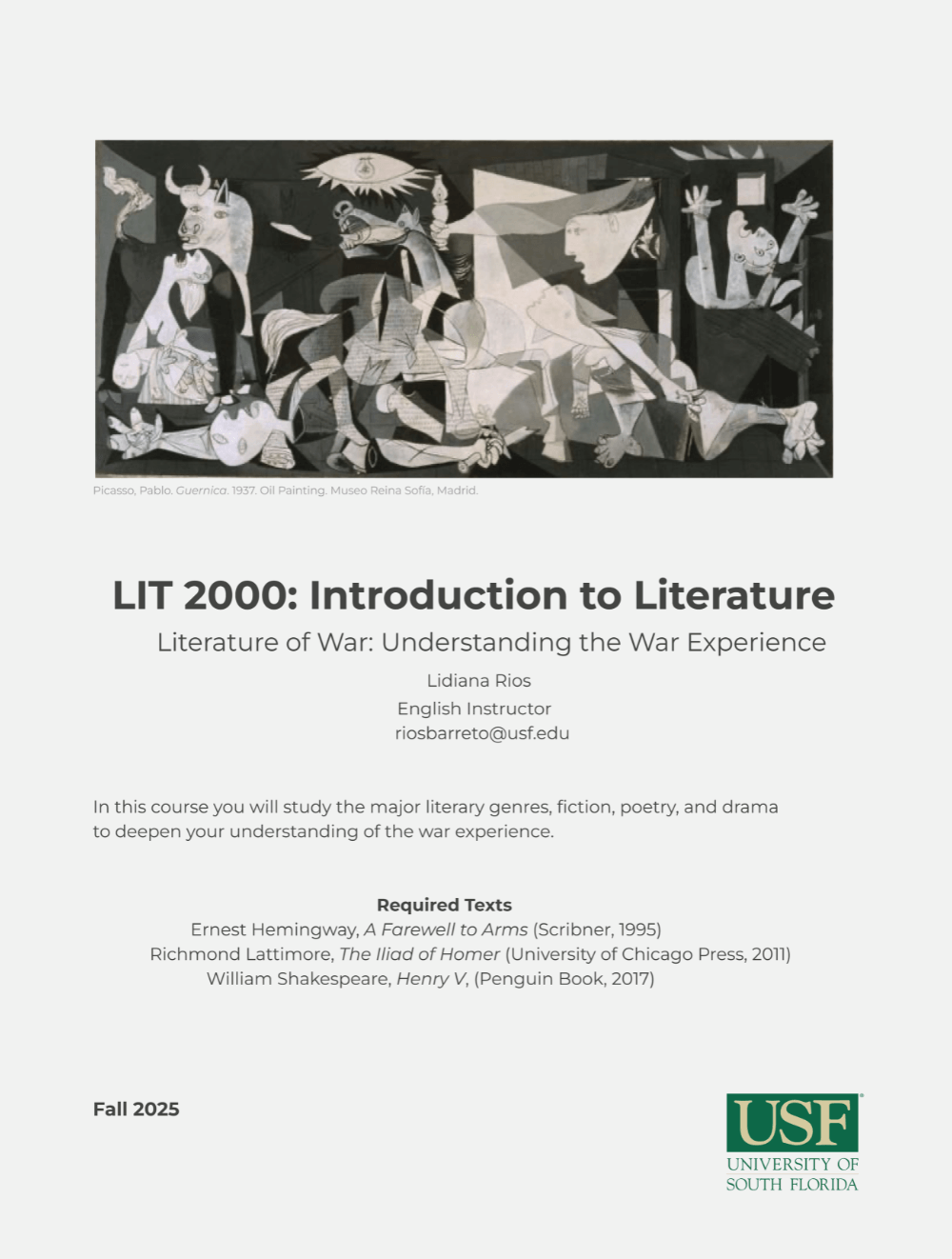
LIT 2000: Intro to Literature
War has profoundly shaped humanity over the course of history, reminding us of the fragility of our existence. In an attempt to make sense of this conflict, writers like Ernest Hemingway, Homer, and William Shakespeare, among others, have provided us with their interpretations of war. Through the study of fiction, poetry, and drama, this course will explore ways in which these authors have dealt with this theme during their respective time periods.
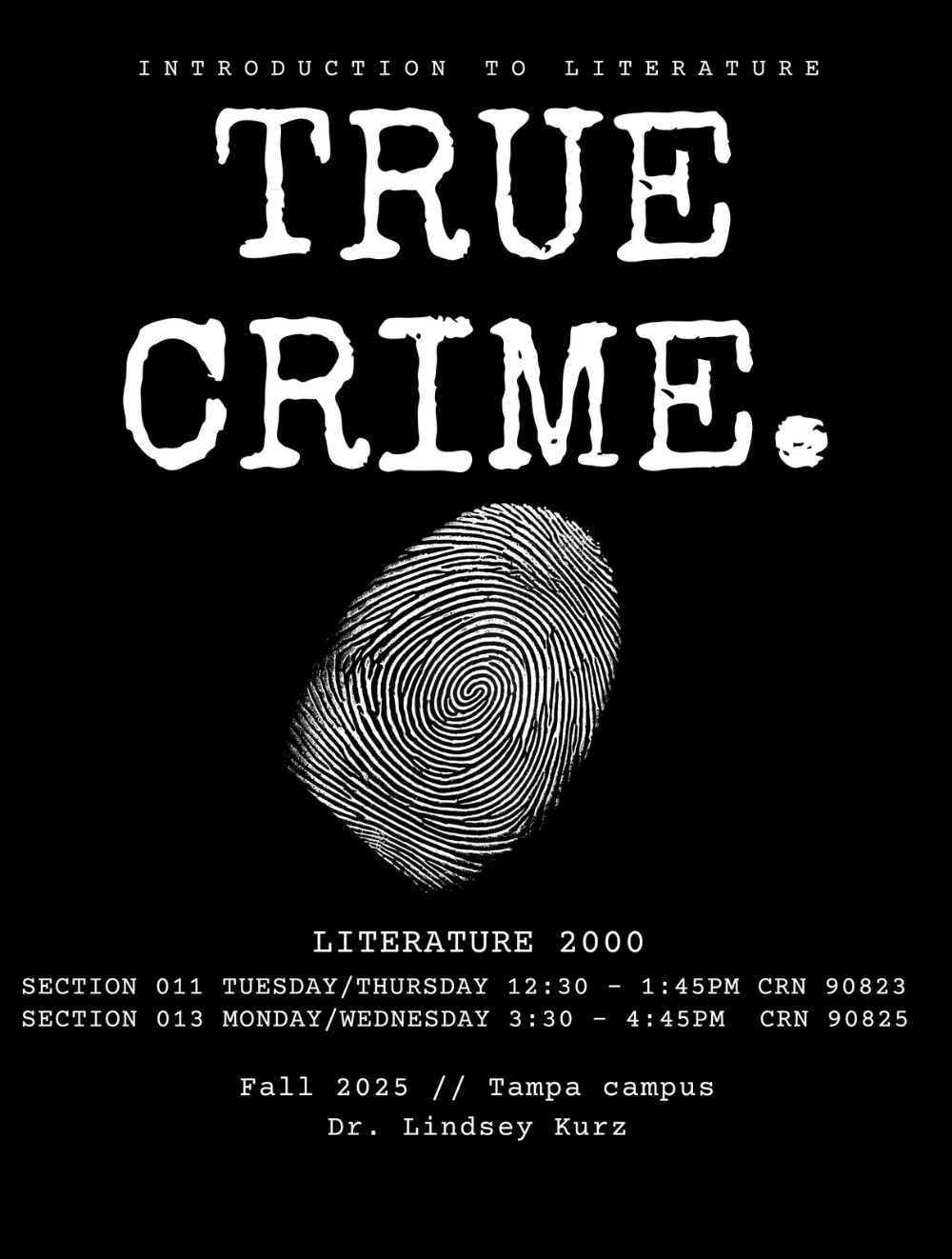
LIT 2000: Intro to Literature
This course will introduce students to the three major literary forms of prose, poetry and drama as well as to various “schools” of literary criticism.
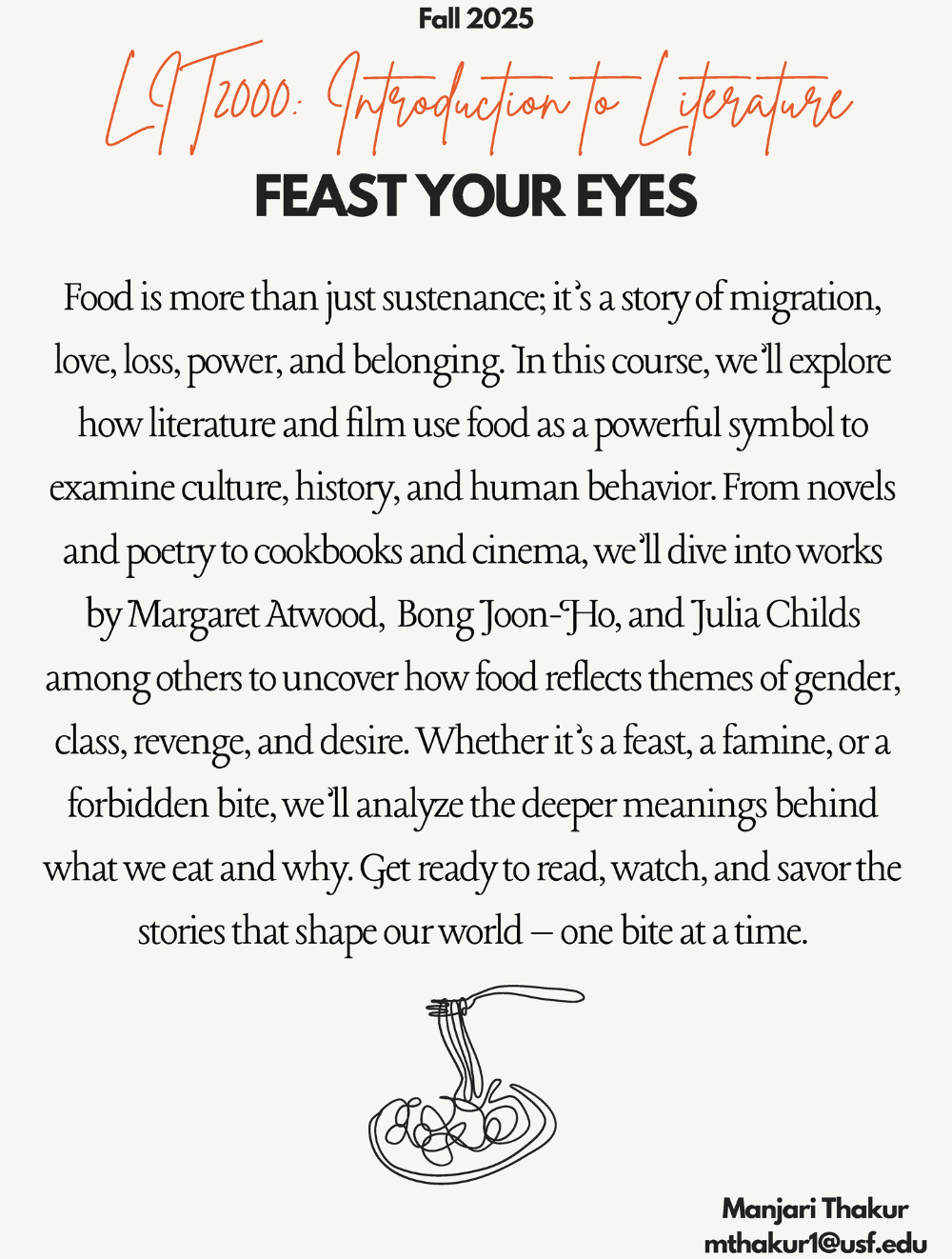
LIT 2000: Intro to Literature
Food is more than just sustenance; it tells stories of migration, love, loss, power, and belonging. In this course, we’ll explore how food becomes a powerful symbol to examine culture, history, and human behavior. From poetry and novels to films and even cookbooks, we will delve into a diverse range of texts that highlight the complexities of identity and cultural memory. Alongside works by Margaret Atwood, Jhumpa Lahiri, and Bong Joon-Ho, we will dive into culinary memoirs and cookbooks that are always considered purely instructional but are now emerging as a rich literary genre, blending storytelling, history, and personal narratives. We will study how food functions as both a literary and cultural artifact, revealing themes of gender, class, revenge, and desire. Whether it’s a feast, a famine, or a forbidden bite, we’ll analyze the deeper meanings behind what we eat and why. Expect lively discussions, deep literary analysis, and an engaging exploration of food’s role in shaping literature and culture.
Come curious, come hungry for stories, ideas, and a fresh perspective on the literature that’s been on your plate all along!
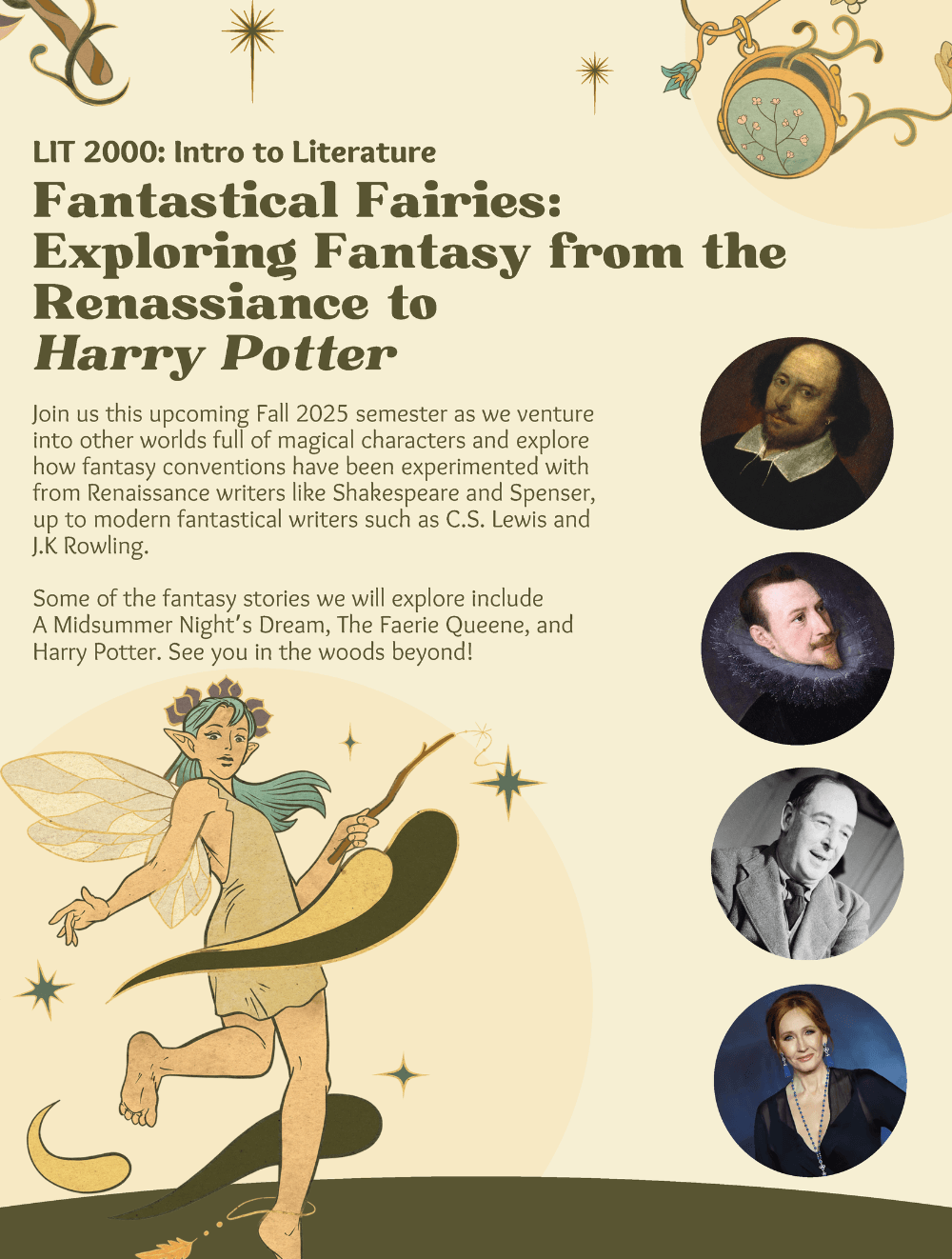
LIT 2000: Intro to Literature
Harry Potter, Game of Thrones, Narnia, The Lord of the Rings. These are just a small number of modern fantasy titles which have captured the popular imagination and made us yearn for a bit more magic in our lives. But how have modern fantasy titles been influenced by earlier periods in history? What elements make up the fantasy tradition, and why should we even read fantastical works in the first place? These questions, and more, will be explored in “LIT 2000—Fantastical Fairies: Exploring Fantasy from the Renaissance to Harry Potter.” In exploring different literary genres, such as drama, poetry, and prose, we will read titles such as Shakespeare’s A Midsummer Night’s Dream, Edmund Spenser’s The Faerie Queene, and J.K. Rowling’s Harry Potter and the Chamber of Secrets. Renaissance texts will be accompanied by adaptations such as graphic novels and story books to help students track with language that might be unfamiliar. We will also see how other writers such as C.S. Lewis conceptualize the fantasy genre, and why we read fairy stories in the first place. Join us as we venture into the magical forest and beyond!
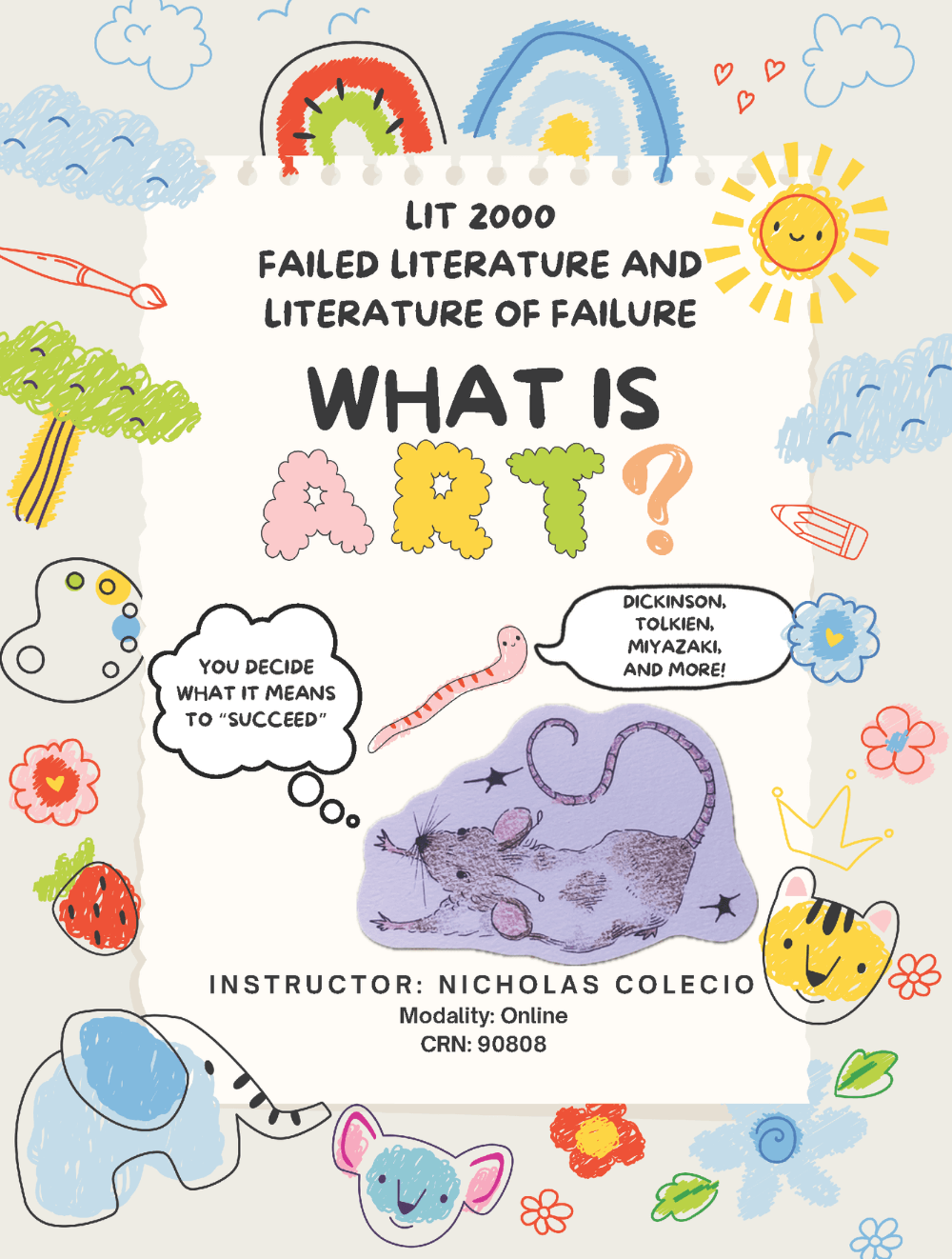
LIT 2000: Intro to Literature
What makes a piece of art stand the test of time? In this course, we will strive to answer questions such as: Why do we value certain works of art over others? And why do some succeed while others fail? Inspired by the Museum of Bad Art and Jack Halberstam’s discussions on Queer Failure, this class will explore both art that fails to be considered “art” and art that captures failure. Examining depictions of failure in literature, poetry, art, film, music, and other various forms of media will help us create an archive of eccentricity, one that broadens our conception of both art and success across cultures. In these failures, where can we find success? Ultimately, what does it mean to succeed?
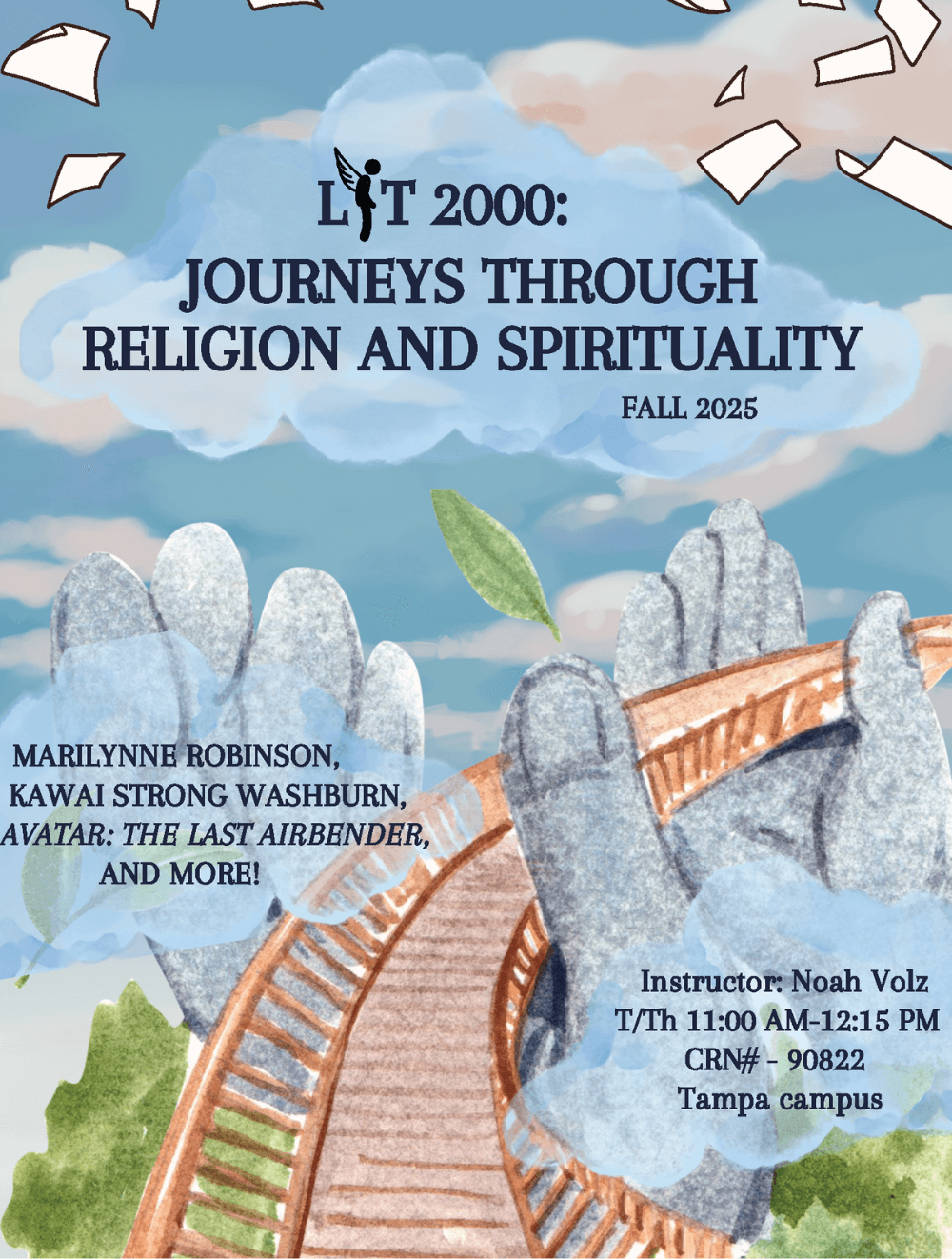
LIT 2000: Intro to Literature
What is religion? What does it mean to be spiritual or non-religious? In this course, we will explore these questions and more as they manifest in works of fiction, music, cinema, and television. Our class will place us at the intersection of human cultural and spiritual encounters, challenging us to interrogate the dynamic between art and religion as well as our complex, often-painful relationship with literary and spiritual experiences. As we examine how religion influences the media that we consume, we will investigate how alternative spiritual frameworks can transform the human experience. Can we be religious without religion? How can media help us navigate the conflicts that we face in our everyday lives? In our course, we will work together to discover how our journeys through literature and religion shape our identities as human beings.
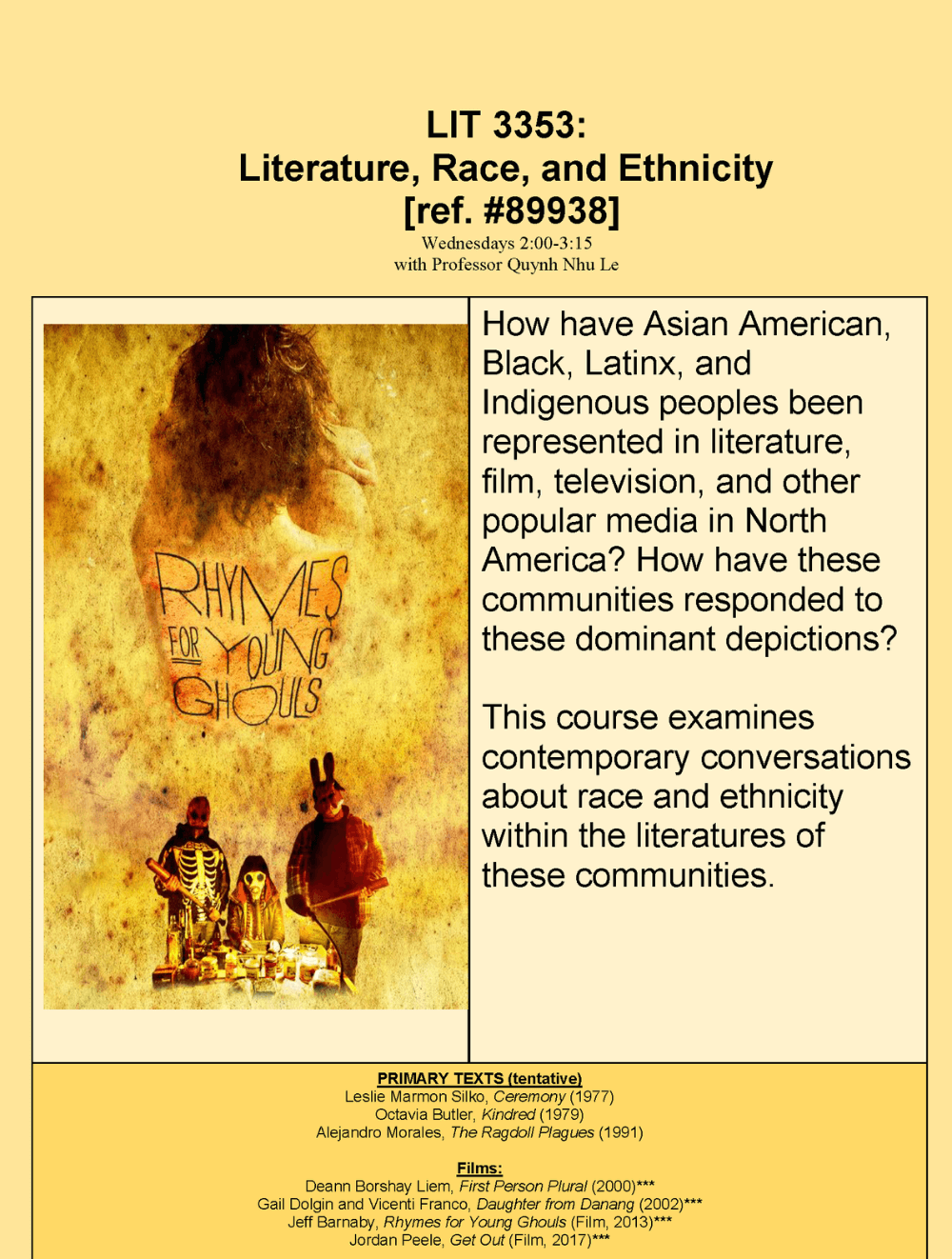
LIT 3353: Literature, Race, & Ethnicity
How have Black, Indigenous, Latinx, and Asian American communities been represented in literature, film, television, and other popular media in North America? How have these communities responded to these dominant media depictions? This course explores histories and contemporary understandings of race, ethnicity, and settler colonialism as they are represented in the literature and films by Black, Indigenous, Latinx, and Asian American writers and cultural producers in North America. Writers and filmmakers we will examine include: Octavia Butler, Jordan Peele, Alejandro Morales, Jeff Barnaby, Leslie Marmon Silko, and John Okada.
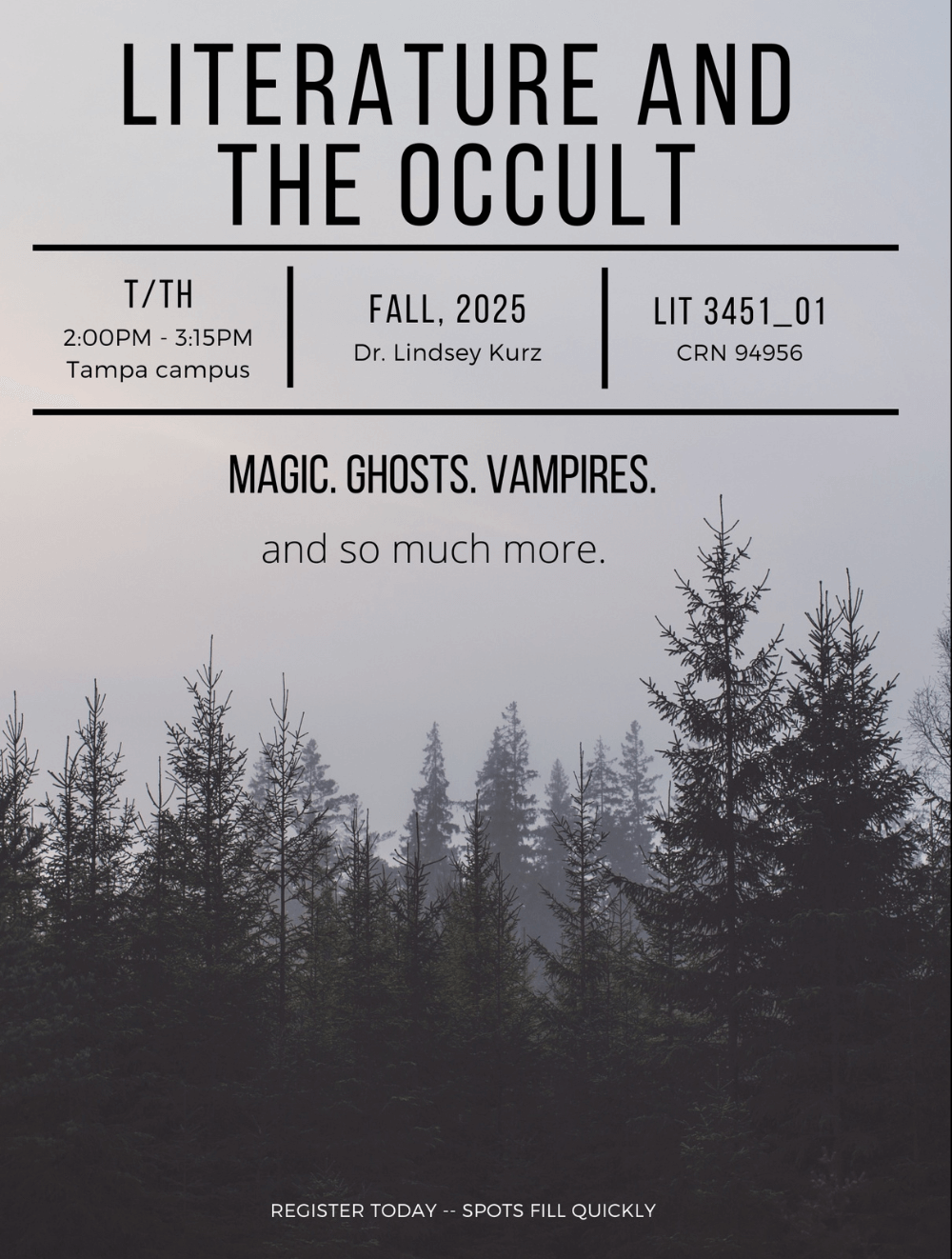
LIT 3451: Literature & The Occult
An introduction to the occult tradition as a major ingredient in English, Continental, American, and Multicultural literature. Focuses on values/ethics, race/ethnicity and gender; thinking and writing skills.
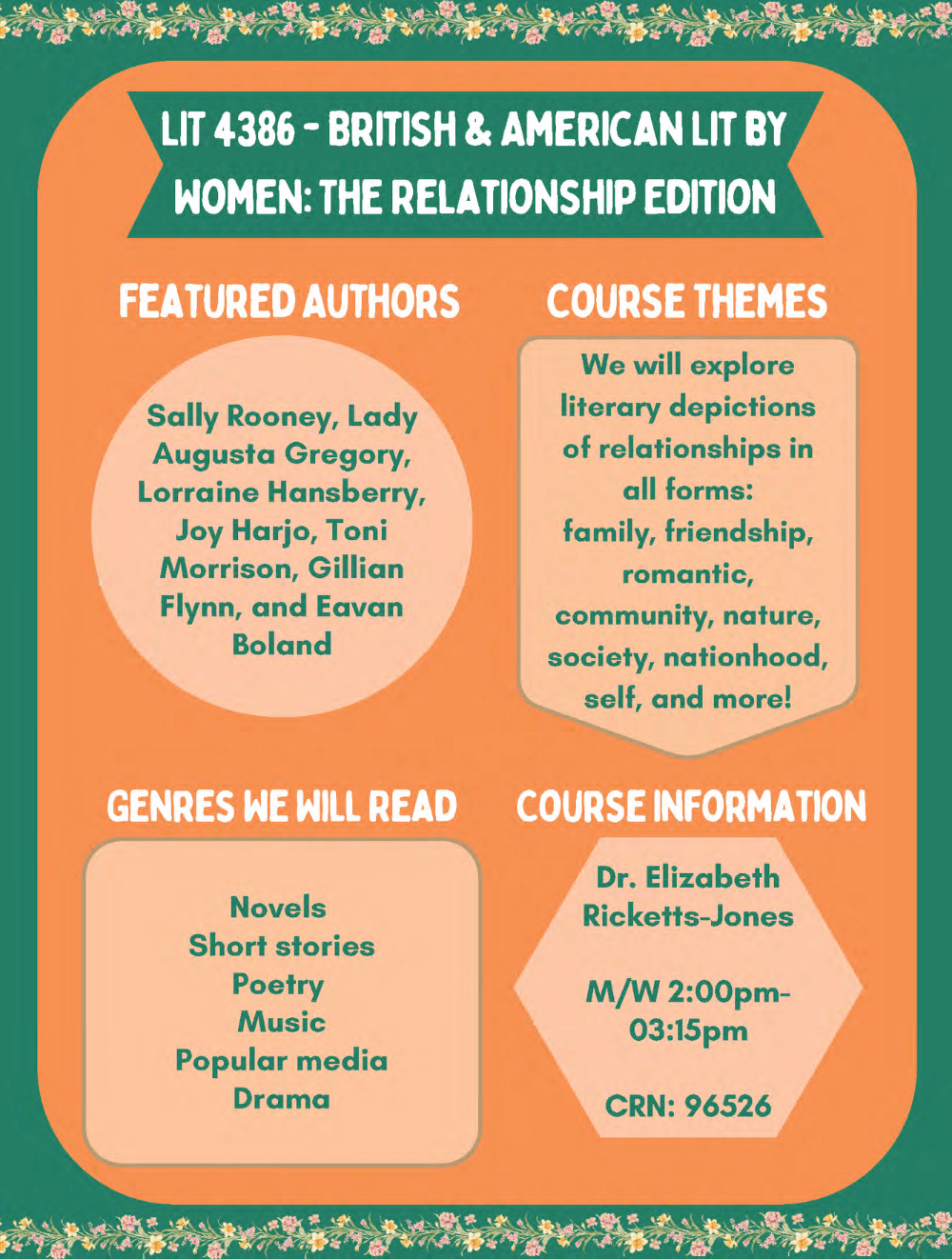
LIT 4386: British & American Lit by Women
Our course will explore literary depictions of relationships in all their forms: family, friendship, romantic, community, nature, society, nationhood, self, etc. We’ll consider how the relationships in the text both define and are defined by characters’ experiences, thematic elements, setting and cultural context, and literary aspects of the text. Students will engage with a variety of genres, including novels, short stories, poetry, music, popular media, and drama. Authors will include mainly 20th century and contemporary authors: Sally Rooney, Lady Augusta Gregory, Lorraine Hansberry, Joy Harjo, Toni Morrison, Gillian Flynn, and Eavan Boland.
Professional & Technical Communications
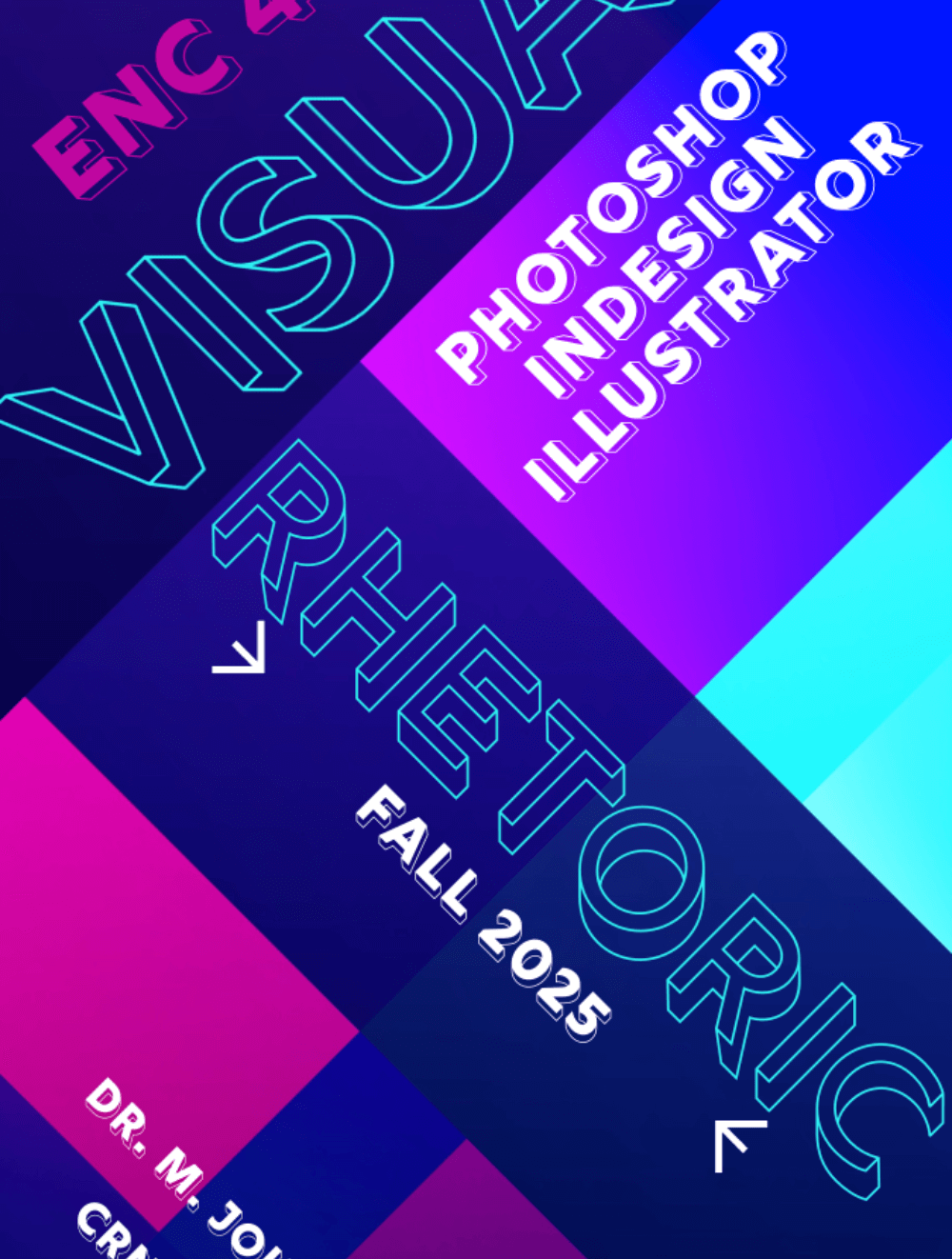
ENC 2210: Virtual Rhetoric Technical Communication
In ENC 4218, students will gain hands-on experience:
- Creating digital designs
- Selecting and using industry-leading creative technologies, including Adobe Photoshop, InDesign, and Illustrator, to compose and edit visuals
- Applying theories, principles, and elements of visual rhetoric to designed documents
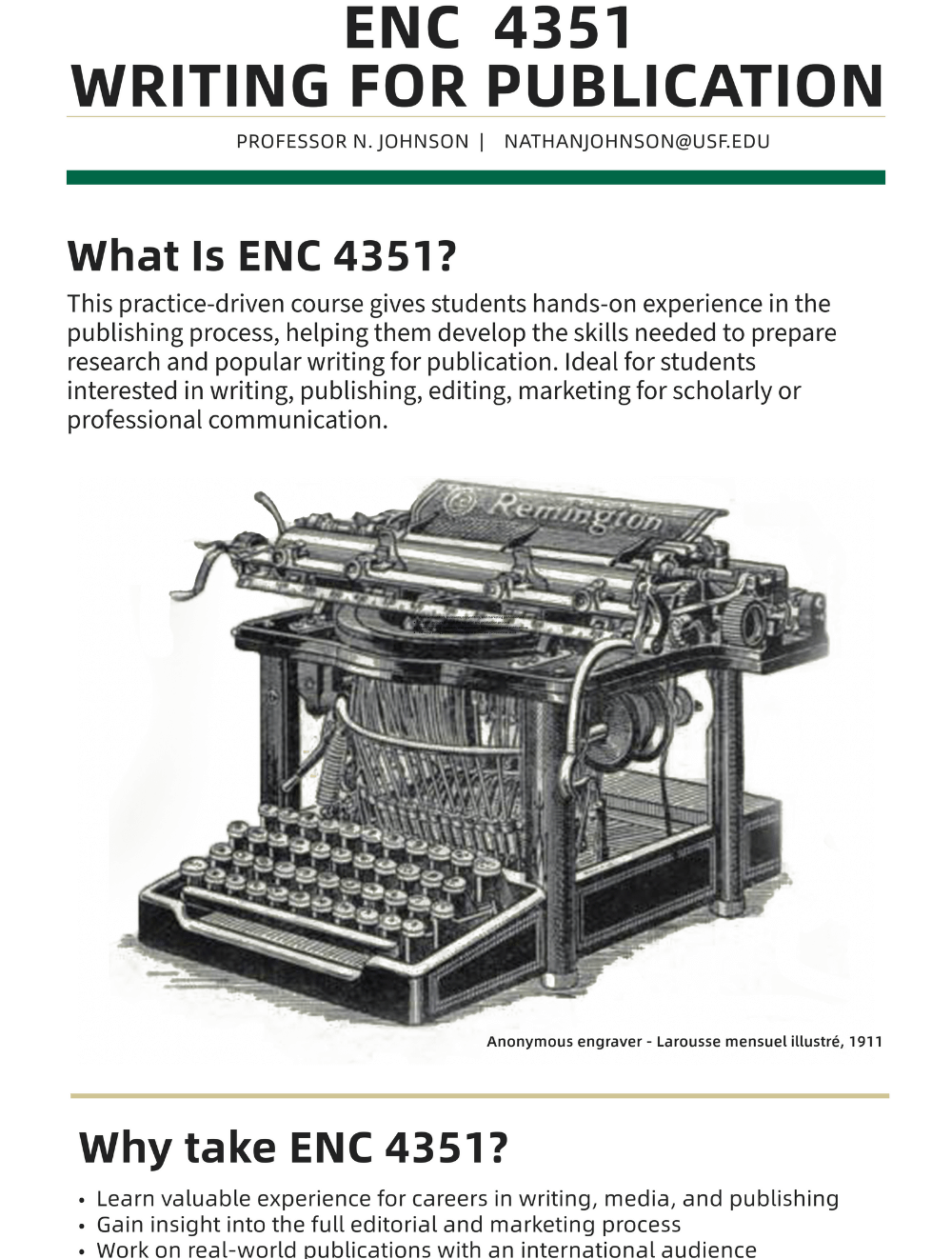
ENC 4351: Writing for Publication
This practice-driven course gives students hands-on experience in the publishing process, helping them develop the skills needed to prepare research and popular writing for publication. Ideal for students interested in writing, publishing, editing, marketing for scholarly or professional communication. Students will develop valuable experience for careers in writing, media, and publishing; gain insight into the full editorial and marketing process; and work on real-world publications with an international audience.